Bass Sheet Music
 "For optimum amp tone onstage, plug your amp into your own AC outlet.." Eric Johnson
"For optimum amp tone onstage, plug your amp into your own AC outlet.." Eric Johnson
Traditional

Stevie Wonder

Stevie Wonder (born Stevland Hardaway Judkins on May 13, 1950, name later changed to Stevland Hardaway Morris) is an American singer-songwriter, multi-instrumentalist, and record producer. A prominent figure in popular music during the latter half of the 20th century , Wonder has recorded more than thirty top ten hits, won 26 Grammy Awards (a record for a solo artist), plus one for lifetime achievement, won an Academy Award for Best Song and been inducted into both the Rock and Roll and Songwriters halls of fame. He has also been awarded the Polar Music Prize.
Blind from infancy, Wonder signed with Motown Records as a pre-adolescent at age twelve, and continues to perform and record for the label to this day. He has nine U.S. number-one hits to his name (on the pop Charts, 20 U.S. R&B number one hits), and album sales totaling more than 150 million units. Wonder has recorded several critically acclaimed albums and hit singles, and writes and produces songs for many of his label mates and outside artists as well. Wonder plays the piano, synthesizer, harmonica, congas, drums, bongos, organ, melodica, and clavinet. In his early career, he was best known for his harmonica work, but today he is better known for his keyboard skills and vocals.
Blind from infancy, Wonder signed with Motown Records as a pre-adolescent at age twelve, and continues to perform and record for the label to this day. He has nine U.S. number-one hits to his name (on the pop Charts, 20 U.S. R&B number one hits), and album sales totaling more than 150 million units. Wonder has recorded several critically acclaimed albums and hit singles, and writes and produces songs for many of his label mates and outside artists as well. Wonder plays the piano, synthesizer, harmonica, congas, drums, bongos, organ, melodica, and clavinet. In his early career, he was best known for his harmonica work, but today he is better known for his keyboard skills and vocals.
Bela Bartok

Béla Viktor János Bartók (pronounced /ˈbɑrtɒk/ (Wells 1990), Hungarian pronunciation: ) (March 25, 1881 – September 26, 1945) was a Hungarian composer and pianist. He is considered to be one of the greatest composers of the 20th century and is regarded, along with Liszt, as his country's greatest composer (Gillies 2001). Through his collection and analytical study of folk music, he was one of the founders of ethnomusicology.
The Magic Numbers
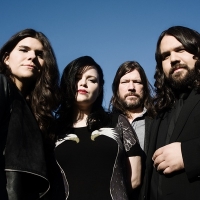
The Magic Numbers are an English pop rock band consisting of two brother and sister pairs, from Hanwell in west London. The group was formed in 2002, releasing their debut album titled The Magic Numbers on 13 June 2005. Their follow-up album, Those the Brokes was released on 6 November 2006, The Runaway was released on 6 June 2010, Alias was released on 18 August 2014, and their most recent album, Outsiders, was released on 11 May 2018.
The Magic Numbers consists of Romeo Stodart (lead guitar, vocals), his sister Michele (bass guitar, vocals, glockenspiel), Angela Gannon (melodica, percussion, keyboard, vocals) and her brother Sean Gannon (drums).
The Magic Numbers consists of Romeo Stodart (lead guitar, vocals), his sister Michele (bass guitar, vocals, glockenspiel), Angela Gannon (melodica, percussion, keyboard, vocals) and her brother Sean Gannon (drums).
Nobuo Uematsu

Nobuo Uematsu (植松伸夫 Uematsu Nobuo?, born March 21, 1959) is a Japanese video game composer and musician, best known for scoring the majority of titles in the Final Fantasy series. He is regarded as one of the most famous and respected composers in the video game community. Uematsu is a self-taught musician; he began to play the piano at the age of eleven or twelve, with Elton John as his biggest influence.
Uematsu joined Square (later Square Enix) in 1985, where he met Final Fantasy creator Hironobu Sakaguchi. They have worked together on numerous titles, most notably the games in the Final Fantasy series. After nearly 20 years in the company, he left Square Enix in 2004 and founded his own company called Smile Please, as well as the music production company Dog Ear Records. He has since composed music as a freelancer for video games primarily developed by Square Enix and Sakaguchi's development studio Mistwalker.
A handful of soundtracks and arranged albums of Uematsu's game scores have been released. Pieces from his video game works have been performed in concerts worldwide, and numerous Final Fantasy concerts have also been held. He has worked with Grammy Award-winning conductor Arnie Roth on several of these concerts. In 2002, he formed a rock band with colleagues Kenichiro Fukui and Tsuyoshi Sekito called The Black Mages, in which Uematsu plays the keyboard. The band plays arranged rock versions of Uematsu's Final Fantasy compositions.
Uematsu joined Square (later Square Enix) in 1985, where he met Final Fantasy creator Hironobu Sakaguchi. They have worked together on numerous titles, most notably the games in the Final Fantasy series. After nearly 20 years in the company, he left Square Enix in 2004 and founded his own company called Smile Please, as well as the music production company Dog Ear Records. He has since composed music as a freelancer for video games primarily developed by Square Enix and Sakaguchi's development studio Mistwalker.
A handful of soundtracks and arranged albums of Uematsu's game scores have been released. Pieces from his video game works have been performed in concerts worldwide, and numerous Final Fantasy concerts have also been held. He has worked with Grammy Award-winning conductor Arnie Roth on several of these concerts. In 2002, he formed a rock band with colleagues Kenichiro Fukui and Tsuyoshi Sekito called The Black Mages, in which Uematsu plays the keyboard. The band plays arranged rock versions of Uematsu's Final Fantasy compositions.
George Colligan
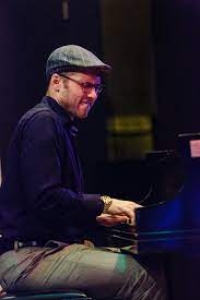
George Colligan (born December 29, 1969) is an American jazz pianist, organist, drummer, trumpeter, educator, composer, and bandleader.As a sideman, he has worked with Phil Woods, Gary Bartz, Robin Eubanks, Billy Higgins, Lee Konitz, Nicholas Payton, Steve Wilson, Richard Bona, Cassandra Wilson, Christian McBride, Buster Williams, Al Foster, Don Byron, Benny Golson, Lonnie Plaxico, and Vanessa Rubin. Colligan received a Chamber Music America Award for composition and won the Jazzconnect.com Award. He has released over twenty albums as a leader and has recorded on over 100 albums as a sideman.[cit
Cannonball Adderley
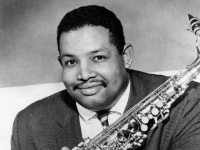
Julian Edwin "Cannonball" Adderley was an American jazz alto saxophonist of the hard bop era of the 1950s and 1960s. Adderley is remembered for his 1966 soul jazz single "Mercy, Mercy, Mercy", a crossover hit on the pop charts
Music theory

Music theory is the study of the practices and possibilities of music. The Oxford Companion to Music describes three interrelated uses of the term "music theory"
Michael Manring

Michael Manring was born in Annapolis, Maryland, as the youngest of four children. His family lived in Norfolk, Virginia and moved to the suburbs of Washington, D.C. in 1969. The Manrings were a very active family musically, providing a very fertile background for Michael's musical development. He and his brother Doug—a guitarist and drummer, later living a long time in Japan—formed a very active rhythm group while in high school, venturing through jazz rock and fusion, playing rock classics at beer parties or pop standards in restaurants and at weddings.
Jacob De Haan
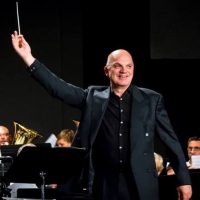
Jacob de Haan (born March 28, 1959 in Heerenveen) is a Dutch contemporary composer known for wind music. He has also published various vocal works, including a number of masses for choir, wind band and soloists. His best known pieces are Oregon and Ammerland.
Avishai Cohen

Avishai Cohen is an Israeli jazz double bassist, composer, singer, and arranger.
The Beatles

The Beatles were a pop and rock group from Liverpool, England formed in 1960. Primarily consisting of John Lennon (rhythm guitar, vocals), Paul McCartney (bass guitar, vocals), George Harrison (lead guitar, vocals) and Ringo Starr (drums, vocals) throughout their career, The Beatles are recognised for leading the mid-1960s musical "British Invasion" into the United States. Although their initial musical style was rooted in 1950s rock and roll and homegrown skiffle, the group explored genres ranging from Tin Pan Alley to psychedelic rock. Their clothes, styles, and statements made them trend-setters, while their growing social awareness saw their influence extend into the social and cultural revolutions of the 1960s. After the band broke up in 1970, all four members embarked upon solo careers.
The Beatles are one of the most commercially successful and critically acclaimed bands in the history of popular music, selling over a billion records internationally. In the United Kingdom, The Beatles released more than 40 different singles, albums, and EPs that reached number one, earning more number one albums (15) than any other group in UK chart history. This commercial success was repeated in many other countries; their record company, EMI, estimated that by 1985 they had sold over one billion records worldwide. According to the Recording Industry Association of America, The Beatles have sold more albums in the United States than any other band. In 2004, Rolling Stone magazine ranked The Beatles number one on its list of 100 Greatest Artists of All Time. According to that same magazine, The Beatles' innovative music and cultural impact helped define the 1960s, and their influence on pop culture is still evident today. In 2008, Billboard magazine released a list of top-selling Hot 100 artists to celebrate the chart's fiftieth anniversary; The Beatles reached #1 again.
The Beatles are one of the most commercially successful and critically acclaimed bands in the history of popular music, selling over a billion records internationally. In the United Kingdom, The Beatles released more than 40 different singles, albums, and EPs that reached number one, earning more number one albums (15) than any other group in UK chart history. This commercial success was repeated in many other countries; their record company, EMI, estimated that by 1985 they had sold over one billion records worldwide. According to the Recording Industry Association of America, The Beatles have sold more albums in the United States than any other band. In 2004, Rolling Stone magazine ranked The Beatles number one on its list of 100 Greatest Artists of All Time. According to that same magazine, The Beatles' innovative music and cultural impact helped define the 1960s, and their influence on pop culture is still evident today. In 2008, Billboard magazine released a list of top-selling Hot 100 artists to celebrate the chart's fiftieth anniversary; The Beatles reached #1 again.
Sammy Nestico
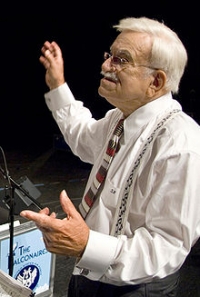
Samuel "Sammy" Louis Nestico (born February 6, 1924 in Pittsburgh, Pennsylvania) is a prolific and well known composer and arranger of big band music. Nestico is most known for his arrangements for the Count Basie orchestra.
Tchaikovsky

Pyotr Il'yich Tchaikovsky (May 7 1840 â November 6 1893) was a Russian composer of the Romantic era. While not part of the nationalistic music group known as "The Five", Tchaikovsky wrote music which, in the opinion of Harold Schonberg, was distinctly Russian: plangent, introspective, with modally-inflected melody and harmony.
Aesthetically, Tchaikovsky remained open to all aspects of Saint Petersburg musical life. He was impressed by Serov and Balakirev as well as the classical values upheld by the conservatory. Both the progressive and conservative camps in Russian music at the time attempted to win him over. Tchaikovsky charted his compositional course between these two factions, retaining his individuality as a composer as well as his Russian identity. In this he was influenced by the ideals of his teacher Nikolai Rubinstein and Nikolai's brother Anton.
Tchaikovsky's musical cosmopolitanism led him to be favored by many Russian music-lovers over the "Russian" harmonies and styles of Mussorgsky, Borodin and Rimsky-Korsakov.
Nonetheless he frequently adapted Russian traditional melodies and dance forms in his music, which enhanced his success in his home country. The success in St. Petersburg at the premiere of his Third Orchestral Suite may have been due in large part to his concluding the work with a polonaise. He also used a polonaise for the final movement of his Third Symphony.
Aesthetically, Tchaikovsky remained open to all aspects of Saint Petersburg musical life. He was impressed by Serov and Balakirev as well as the classical values upheld by the conservatory. Both the progressive and conservative camps in Russian music at the time attempted to win him over. Tchaikovsky charted his compositional course between these two factions, retaining his individuality as a composer as well as his Russian identity. In this he was influenced by the ideals of his teacher Nikolai Rubinstein and Nikolai's brother Anton.
Tchaikovsky's musical cosmopolitanism led him to be favored by many Russian music-lovers over the "Russian" harmonies and styles of Mussorgsky, Borodin and Rimsky-Korsakov.
Nonetheless he frequently adapted Russian traditional melodies and dance forms in his music, which enhanced his success in his home country. The success in St. Petersburg at the premiere of his Third Orchestral Suite may have been due in large part to his concluding the work with a polonaise. He also used a polonaise for the final movement of his Third Symphony.
Alain Caron

Alain Caron is a French Canadian jazz bassist. The youngest of 11 children, Caron started playing bass at the age of 11 and started to follow jazz at the age of 15. His musical skills were formalized by attending correspondence classes with jazz improvising teacher Charlie Banacos and attending a summer session at the Berklee School of Music.
Lennie Tristano
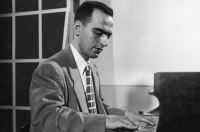
Leonard Joseph Tristano was an American jazz pianist, composer, arranger, and teacher of jazz improvisation. Tristano studied for bachelor's and master's degrees in music in Chicago before moving to New York City in 1946.
Carlos Gardel

Carlos Gardel (11 December 1890 – 24 June 1935) was a singer, songwriter and actor, and is perhaps the most prominent figure in the history of tango. The unerring musicality of Gardel's baritone voice and the dramatic phrasing of his lyrics made miniature masterpieces of his hundreds of three-minute tango recordings. Together with lyricist and long-time collaborator Alfredo Le Pera, Gardel wrote several classic tangos, most notably "Mi Buenos Aires querido", "Por una cabeza" and "El día que me quieras".
Gardel died in an airplane crash at the height of his career, becoming an archetypal tragic hero mourned throughout Latin America. For many, Gardel embodies the soul of the tango style. He is commonly referred to as "Carlitos", "El Zorzal" (The Song Thrush), "The King of Tango", "El Mago" (The Magician) and "El Mudo" (The Mute).
Gardel died in an airplane crash at the height of his career, becoming an archetypal tragic hero mourned throughout Latin America. For many, Gardel embodies the soul of the tango style. He is commonly referred to as "Carlitos", "El Zorzal" (The Song Thrush), "The King of Tango", "El Mago" (The Magician) and "El Mudo" (The Mute).
Zoltan Paulinyi
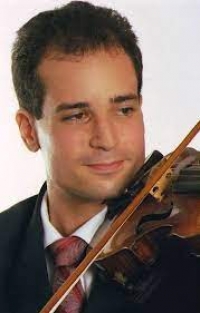
Zoltán Paulínyi Körmendy (Pittsfield, MA, 1977) conhecido pelo nome artístico de Zoltan Paulini, é um violinista, violista (barroco e moderno) e compositor americano-brasileiro. É profissionalmente ativo desde 1995, e utiliza principalmente instrumentos fabricados e restaurados pelo luthier Carlos Martins del Picchia.
Frank Zappa
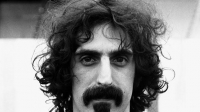
Frank Vincent Zappa Jr. American guitarist, singer, composer. He was born a Sicilian father and a Franco-Italian mother.
Date of birth: December 21, 1940, Baltimore, Maryland, United States Date and place of death: December 4, 1993, Hollywood Hills, Los Angeles, California, USA
Date of birth: December 21, 1940, Baltimore, Maryland, United States Date and place of death: December 4, 1993, Hollywood Hills, Los Angeles, California, USA
Joe Zawinul
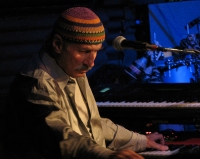
Josef Erich Zawinul (July 7, 1932 – September 11, 2007) was an Austrian jazz keyboardist and composer.
First coming to prominence with saxophonist Cannonball Adderley, Zawinul went on to play with trumpeter Miles Davis, and to become one of the creators of jazz fusion, an innovative musical genre that combined jazz with elements of rock and world music. Later, Zawinul co-founded the groups Weather Report and the world fusion music oriented Zawinul Syndicate. Additionally, he made pioneering use of electric piano and synthesizers. Zawinul won the "Best Keyboardist" award 30 times from American jazz magazine Down Beat's critics' poll.
Several artists have honored Zawinul with songs, notably Brian Eno's instrumental "Zawinul/Lava", John McLaughlin's instrumental "Jozy", Warren Cuccurullo's "Hey Zawinul", Bob Baldwin's "Joe Zawinul", and Biréli Lagrène's instrumental "Josef". Zawinul's playing style is often dominated by quirky melodic improvisations —both bebop, ethnic and pop sounding— combined with sparse but rhythmic playing of big-band sounding chords or bass lines. In Weather Report, he often employed a vocoder as well as pre-recorded sounds played (i.e filtered and transposed) through a synthesizer, creating a very distinctive, often beautiful, synthesis of jazz harmonics and "noise" ("using all the sounds the world generates"). Many considered Zawinul as the "best" synthesizer player "in jazz", frequently employing several keyboards with live settings of his bands.
First coming to prominence with saxophonist Cannonball Adderley, Zawinul went on to play with trumpeter Miles Davis, and to become one of the creators of jazz fusion, an innovative musical genre that combined jazz with elements of rock and world music. Later, Zawinul co-founded the groups Weather Report and the world fusion music oriented Zawinul Syndicate. Additionally, he made pioneering use of electric piano and synthesizers. Zawinul won the "Best Keyboardist" award 30 times from American jazz magazine Down Beat's critics' poll.
Several artists have honored Zawinul with songs, notably Brian Eno's instrumental "Zawinul/Lava", John McLaughlin's instrumental "Jozy", Warren Cuccurullo's "Hey Zawinul", Bob Baldwin's "Joe Zawinul", and Biréli Lagrène's instrumental "Josef". Zawinul's playing style is often dominated by quirky melodic improvisations —both bebop, ethnic and pop sounding— combined with sparse but rhythmic playing of big-band sounding chords or bass lines. In Weather Report, he often employed a vocoder as well as pre-recorded sounds played (i.e filtered and transposed) through a synthesizer, creating a very distinctive, often beautiful, synthesis of jazz harmonics and "noise" ("using all the sounds the world generates"). Many considered Zawinul as the "best" synthesizer player "in jazz", frequently employing several keyboards with live settings of his bands.
The Isley Brothers
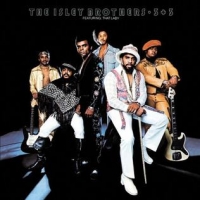
The Isley Brothers (/ˈaɪzliː/) are an American musical group originally from Cincinnati, Ohio, that started as a vocal trio consisting of brothers O'Kelly Isley Jr., Rudolph Isley and Ronald Isley in the 1950s. With a career spanning over seven decades, the group has been cited as having enjoyed one of the "longest, most influential, and most diverse careers in the pantheon of popular music".Together with a fourth brother, Vernon, the group performed gospel music until Vernon's death a few years after its formation. After moving to the New York City area in the late 1950s, the group had their first successes during these early years, first coming to prominence in 1959 with their fourth single, "Shout", written by the three brothers.
Jimmy Forrest
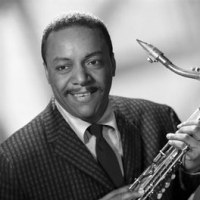
James Robert Forrest Jr. (January 24, 1920 – August 26, 1980) was an American jazz musician, who played tenor saxophone throughout his career.Forrest is known for his first solo recording of "Night Train". It reached No. 1 on the Billboard R&B chart in March 1952, and stayed at the top for seven weeks. "Hey Mrs. Jones" (No. 3 R&B) and "Bolo Blues" were his other hits. All were made for United Records, which recorded Forrest between 1951 and 1953. He recorded frequently as both a sideman and a bandleader.
Vittorio Monti

Vittorio Monti (6 January 1868 – 20 June 1922) was an Italian composer, violinist, and conductor. Monti was born in Naples where he studied violin and composition at the Conservatorio di San Pietro a Majella. Around 1900 he got an assignment as the conductor for the Lamoureux Orchestra in Paris, where he wrote several ballets and operettas, for example Noël de Pierrot.
His only famous work is his Csárdás, written around 1904 and played by almost every gypsy orchestra.
His only famous work is his Csárdás, written around 1904 and played by almost every gypsy orchestra.
Joe Henderson
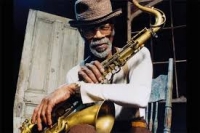
Born in Lima, Ohio, Henderson was one of five sisters and nine brothers. He was encouraged by his parents Dennis and Irene (née Farley) and older brother James T. to study music. He dedicated his first album to them "for being so understanding and tolerant" during his formative years. Early musical interests included drums, piano, saxophone and composition. According to Kenny Dorham, two local piano teachers who went to school with Henderson's brothers and sisters, Richard Patterson and Don Hurless, gave him a knowledge of the piano. He was particularly enamored of his brother's record collection. It seems that a hometown drummer, John Jarette, advised Henderson to listen to musicians like Lester Young, Stan Getz, Dexter Gordon and Charlie Parker. He also liked Flip Phillips, Lee Konitz and the Jazz at the Philharmonic recordings. However, Parker became his greatest inspiration. His first approach to the saxophone was under the tutelage of Herbert Murphy in high school. In this period of time, he wrote several scores for the school band
Deep Purple

Deep Purple are an English rock band formed in Hertford in 1968. Along with Led Zeppelin and Black Sabbath, they are considered to be among the pioneers of heavy metal and modern hard rock, although some band members have tried not to categorise themselves as any one genre. The band also incorporated classical music, blues-rock, pop and progressive rock elements. They were once listed by the Guinness Book of World Records as the world's loudest band, and have sold over 100 million albums worldwide. Deep Purple were ranked #22 on VH1's Greatest Artists of Hard Rock programme.
The band have gone through many line-up changes and an eight-year hiatus (1976–84). The 1968–76 line-ups are commonly labeled Mark I, II, III and IV. Their second and most commercially successful line-up featured Ian Gillan (vocals), Ritchie Blackmore (guitar), Jon Lord (keyboards), Roger Glover (bass) and Ian Paice (drums). This line-up was active from 1969 to 1973 and was revived from 1984 to 1989 and again in 1993, before the rift between Blackmore and other members became unbridgeable. The current line-up including guitarist Steve Morse has been much more stable, though Lord's retirement in 2002 has left Paice as the only original member.
The band have gone through many line-up changes and an eight-year hiatus (1976–84). The 1968–76 line-ups are commonly labeled Mark I, II, III and IV. Their second and most commercially successful line-up featured Ian Gillan (vocals), Ritchie Blackmore (guitar), Jon Lord (keyboards), Roger Glover (bass) and Ian Paice (drums). This line-up was active from 1969 to 1973 and was revived from 1984 to 1989 and again in 1993, before the rift between Blackmore and other members became unbridgeable. The current line-up including guitarist Steve Morse has been much more stable, though Lord's retirement in 2002 has left Paice as the only original member.
Hiromi

Hiromi Uehara, known professionally as Hiromi, is a jazz composer and pianist born in Hamamatsu, Japan. She is known for her virtuosic technique, energetic live performances and blend of musical genres such as stride, post-bop, progressive rock, classical and fusion in her compositions.
The Blues Brothers
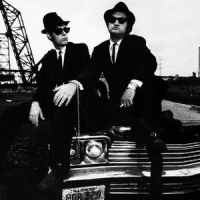
The Blues Brothers are a Grammy Award-nominated American blues and soul revivalist band founded in 1978 by comedians Dan Aykroyd and John Belushi as part of a musical sketch on Saturday Night Live. Belushi and Aykroyd, respectively in character as lead vocalist "Joliet" Jake Blues and harpist/vocalist Elwood Blues, fronted the band, which was composed of well-known and respected musicians. The band made its debut as the musical guest on the April 22, 1978, episode of Saturday Night Live.
The band then began to take on a life beyond the confines of the television screen, releasing an album, Briefcase Full of Blues, in 1978, and then having a Hollywood film, The Blues Brothers, created around its characters in 1980.
After the death of Belushi in 1982, the Blues Brothers have continued to perform with a rotation of guest singers and other band members. The original band reformed in 1988 for a world tour and again in 1998 for a sequel to the film, Blues Brothers 2000. They make regular appearances at musical festivals worldwide.
The band then began to take on a life beyond the confines of the television screen, releasing an album, Briefcase Full of Blues, in 1978, and then having a Hollywood film, The Blues Brothers, created around its characters in 1980.
After the death of Belushi in 1982, the Blues Brothers have continued to perform with a rotation of guest singers and other band members. The original band reformed in 1988 for a world tour and again in 1998 for a sequel to the film, Blues Brothers 2000. They make regular appearances at musical festivals worldwide.
Ben Folds

Benjamin Scott Folds (born September 12, 1966 in Winston-Salem, North Carolina) is an American singer and pianist. He originally gained fame as a member of the rock band, Ben Folds Five. Ben has released three solo albums: Fear of Pop: Volume 1, Rockin' the Suburbs, and Ben Folds Live. Fear of Pop was released while Ben Folds Five were still together; Suburbs and Live were released afterwards. Since Fear of Pop is highly experimental and Live is a collection of live solo recordings of mostly songs originally recorded with Ben Folds Five, Rockin' the Suburbs is Ben's first proper solo release. In late 2003 two solo EPs: Speed Graphic and Sunny 16 were released, with a third entitled Super D released in mid-2004. He currently resides in Adelaide, Australia with his wife, Frally Hynes, and two children, Louis and Grace. He tours Japan and the United States, as well as other parts of the world periodically.
Folds also produced and arranged the most recent William Shatner album, Has Been (2004); he previously worked with Shatner on the songs 'In Love' and 'Still in Love' for Fear of Pop.
Folds described his former band, Ben Folds Five, as 'punk rock for sissies,' and his oddball lyrics often contain nuances of depression, melancholy and self-conflict. While he was with the band Ben Folds Five and since his departure, Folds also provided a number of songs for films soundtrack. Some of these include 'Lonely Christmas Eve' for the film How the Grinch Stole Christmas! (2000) and a rendition of the Beatles' 'Golden Slumbers' for the film I Am Sam (2001).
On a planned tour of Australia, Folds teamed up with fellow namesakes Ben Kweller and Ben Lee to travel the country together as The Bens, at the suggestion of a fan on Ben Kweller's official website. The trio also went on to record an four-track EP together, entitled The Bens.
In summer of 2004, Folds co-headlined an American tour with fellow rockers Rufus Wainwright and Guster. His fourth solo album entitled 'Songs for Silverman' is slated for release on April 26, 2005.
Folds also produced and arranged the most recent William Shatner album, Has Been (2004); he previously worked with Shatner on the songs 'In Love' and 'Still in Love' for Fear of Pop.
Folds described his former band, Ben Folds Five, as 'punk rock for sissies,' and his oddball lyrics often contain nuances of depression, melancholy and self-conflict. While he was with the band Ben Folds Five and since his departure, Folds also provided a number of songs for films soundtrack. Some of these include 'Lonely Christmas Eve' for the film How the Grinch Stole Christmas! (2000) and a rendition of the Beatles' 'Golden Slumbers' for the film I Am Sam (2001).
On a planned tour of Australia, Folds teamed up with fellow namesakes Ben Kweller and Ben Lee to travel the country together as The Bens, at the suggestion of a fan on Ben Kweller's official website. The trio also went on to record an four-track EP together, entitled The Bens.
In summer of 2004, Folds co-headlined an American tour with fellow rockers Rufus Wainwright and Guster. His fourth solo album entitled 'Songs for Silverman' is slated for release on April 26, 2005.
Kings of Leon

Kings of Leon is an American rock band that formed in Nashville, Tennessee in 1999, consisting of brothers Anthony Caleb Followill (lead vocals, rhythm guitar), Ivan Nathan Followill (drums, percussion, backing vocals) and Michael Jared Followill (bass guitar, backing vocals), with their cousin Cameron Matthew Followill (lead guitar, backing vocals). Each member of the family group is known by his middle name (second given name) as opposed to his first given name.
The band's early music was an upbeat blend of southern rock and blues influences but the band has gradually expanded their sound to include a variety of genres and a more alternative sound. Kings of Leon achieved initial success in the United Kingdom with nine Top 40 singles, two BRIT Awards in 2008, and all three of the band's albums at the time peaking in the top five of the UK Albums Chart. Their third album Because of the Times also reached the #1 spot. After the release of Only by the Night in September 2008 they finally achieved chart success in their native United States. The singles "Sex on Fire", "Use Somebody" and "Notion" all peaked at #1 on the Hot Modern Rock Tracks. The album itself was their first ever platinum-selling album in the United States, was the best selling album in Australia of 2008, certified 8x Platinum and achieved 5x Platinum certification in the United Kingdom.
The band's early music was an upbeat blend of southern rock and blues influences but the band has gradually expanded their sound to include a variety of genres and a more alternative sound. Kings of Leon achieved initial success in the United Kingdom with nine Top 40 singles, two BRIT Awards in 2008, and all three of the band's albums at the time peaking in the top five of the UK Albums Chart. Their third album Because of the Times also reached the #1 spot. After the release of Only by the Night in September 2008 they finally achieved chart success in their native United States. The singles "Sex on Fire", "Use Somebody" and "Notion" all peaked at #1 on the Hot Modern Rock Tracks. The album itself was their first ever platinum-selling album in the United States, was the best selling album in Australia of 2008, certified 8x Platinum and achieved 5x Platinum certification in the United Kingdom.
Pat martino

Pat Martino is a jazz guitarist and composer. Wikipedia Born: August 25, 1944 (age 75 years), Philadelphia, Pennsylvania, United States Full name: Pat Azzara Spouse: Ayako Asahi (m. 1997) Genres: Jazz fusion, Mainstream jazz, Soul jazz
Diego Schissi
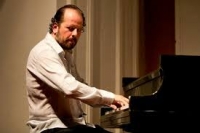
Diego Schissi was born in Buenos Aires, in 1969. His musical studies took place at the Conservatorio Nacional Carlos López Buchardo and the University of Miami. He studied piano with Susana Agrest, Ana Cigarrán and Ana Stampalia, and harmony and counterpoint with Daniel Montes, Manolo Juárez and Oscar Edelstein.
Casablanca
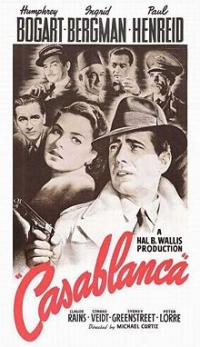
Casablanca (1942) is an American romance film directed by Michael Curtiz, starring Humphrey Bogart, Ingrid Bergman and Paul Henreid and featuring Claude Rains, Conrad Veidt, Sidney Greenstreet and Peter Lorre. It is set in the Vichy-controlled Moroccan city of Casablanca during World War II and focuses on a man's conflict between, in the words of one character, love and virtue: He must choose between his love for a woman and doing the right thing, helping her and her Resistance leader husband escape from Casablanca to continue his fight against the Nazis.
Although it was an A-list movie, with established stars and first-rate writers – Julius J. Epstein, Philip G. Epstein and Howard Koch received credit for the screenplay – no one involved with its production expected Casablanca to be anything out of the ordinary; Yet, despite a changing assortment of screenwriters frantically adapting an unstaged play and barely keeping ahead of production, and Bogart attempting his first romantic lead role, Casablanca won three Academy Awards, including Best Picture. Its characters, dialogue, and music have become iconic, and Casablanca has grown in popularity to the point that it now consistently ranks near the top of lists of the greatest films of all time.
Although it was an A-list movie, with established stars and first-rate writers – Julius J. Epstein, Philip G. Epstein and Howard Koch received credit for the screenplay – no one involved with its production expected Casablanca to be anything out of the ordinary; Yet, despite a changing assortment of screenwriters frantically adapting an unstaged play and barely keeping ahead of production, and Bogart attempting his first romantic lead role, Casablanca won three Academy Awards, including Best Picture. Its characters, dialogue, and music have become iconic, and Casablanca has grown in popularity to the point that it now consistently ranks near the top of lists of the greatest films of all time.
The Bad Plus
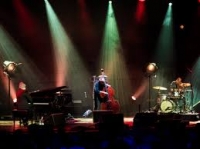
The Bad Plus is an American jazz trio from Minneapolis, Minnesota, United States, consisting of bassist Reid Anderson, pianist Orrin Evans, and drummer Dave King.Ethan Iverson, Reid Anderson and David King first played together in 1989 but established The Bad Plus in 2000. The band recorded their first album, a self-titled effort released on Fresh Sound, after playing only three gigs together. A live performance at the Village Vanguard was heard by Columbia Records representative Yves Beauvais, and the band was signed to Columbia in 2002. Their major label debut album, These Are the Vistas, was released in 2003.
Joni Mitchell
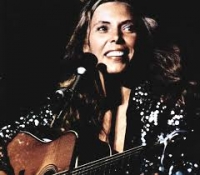
Joni Mitchell was born on November 7, 1943, in Fort Macleod, Canada. In 1968, she recorded her first, self-titled album. Other highly successful albums followed. Mitchell won her first Grammy Award (best folk performance) for her 1969 album, Clouds. She has won seven more Grammy Awards since then, in several different categories, including traditional pop, pop music and lifetime achievement.
Schubert

Franz Peter Schubert (January 31, 1797 – November 19, 1828) was an Austrian composer. He wrote some 600 lieder, nine symphonies (including the famous "Unfinished Symphony"), liturgical music, operas, and a large body of chamber and solo piano music. He is particularly noted for his original melodic and harmonic writing.
While Schubert had a close circle of friends and associates who admired his work (including his teacher Antonio Salieri, and the prominent singer Johann Michael Vogl), wider appreciation of his music during his lifetime was limited at best. He was never able to secure adequate permanent employment, and for most of his career he relied on the support of friends and family. Interest in Schubert's work increased dramatically in the decades following his death and he is now widely considered to be one of the greatest composers in the Western tradition.
While he was clearly influenced by the Classical sonata forms of Beethoven and Mozart (his early works, among them notably the 5th Symphony, are particularly Mozartean), his formal structures and his developments tend to give the impression more of melodic development than of harmonic drama. This combination of Classical form and long-breathed Romantic melody sometimes lends them a discursive style: his 9th Symphony was described by Robert Schumann as running to "heavenly lengths". His harmonic innovations include movements in which the first section ends in the key of the subdominant rather than the dominant (as in the last movement of the Trout Quintet). Schubert's practice here was a forerunner of the common Romantic technique of relaxing, rather than raising, tension in the middle of a movement, with final resolution postponed to the very end.
While Schubert had a close circle of friends and associates who admired his work (including his teacher Antonio Salieri, and the prominent singer Johann Michael Vogl), wider appreciation of his music during his lifetime was limited at best. He was never able to secure adequate permanent employment, and for most of his career he relied on the support of friends and family. Interest in Schubert's work increased dramatically in the decades following his death and he is now widely considered to be one of the greatest composers in the Western tradition.
While he was clearly influenced by the Classical sonata forms of Beethoven and Mozart (his early works, among them notably the 5th Symphony, are particularly Mozartean), his formal structures and his developments tend to give the impression more of melodic development than of harmonic drama. This combination of Classical form and long-breathed Romantic melody sometimes lends them a discursive style: his 9th Symphony was described by Robert Schumann as running to "heavenly lengths". His harmonic innovations include movements in which the first section ends in the key of the subdominant rather than the dominant (as in the last movement of the Trout Quintet). Schubert's practice here was a forerunner of the common Romantic technique of relaxing, rather than raising, tension in the middle of a movement, with final resolution postponed to the very end.
Hair
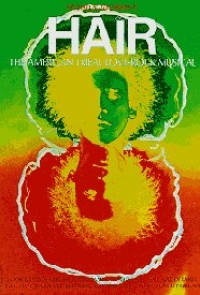
Hair: The American Tribal Love-Rock Musical is a rock musical with a book and lyrics by James Rado and Gerome Ragni and music by Galt MacDermot. A product of the hippie counter-culture and sexual revolution of the 1960s, several of its songs became anthems of the anti-Vietnam War peace movement. The musical's profanity, its depiction of the use of illegal drugs, its treatment of sexuality, its irreverence for the American flag, and its nude scene caused much comment and controversy. The musical broke new ground in musical theatre by defining the genre of the "rock musical", utilizing a racially-integrated cast and inviting the audience onstage for a "Be-in" finale.
Hair tells the story of the "tribe", a group of politically active, long-haired "Hippies of the Age of Aquarius" fighting against conscription to the Vietnam War and living a bohemian life together in New York City. They struggle to balance their young lives, loves and the sexual revolution with their pacifist rebellion against the war and the conservative impulses of their parents and society. Claude, one of the leaders of the tribe, must decide whether or not to resist the draft, as his friends have done.
After an off-Broadway debut in October 1967 at Joseph Papp's Public Theater and another run in a midtown discothèque space, the show opened on Broadway in April 1968 and ran for 1,750 performances, followed by a successful London production, which ran for 1,997 performances. Numerous productions have been staged around the world since then, and numerous recordings of the musical have been released. Several of the songs from its score became Top 40 hits, and a successful movie adaptation was released in 1979.
Hair tells the story of the "tribe", a group of politically active, long-haired "Hippies of the Age of Aquarius" fighting against conscription to the Vietnam War and living a bohemian life together in New York City. They struggle to balance their young lives, loves and the sexual revolution with their pacifist rebellion against the war and the conservative impulses of their parents and society. Claude, one of the leaders of the tribe, must decide whether or not to resist the draft, as his friends have done.
After an off-Broadway debut in October 1967 at Joseph Papp's Public Theater and another run in a midtown discothèque space, the show opened on Broadway in April 1968 and ran for 1,750 performances, followed by a successful London production, which ran for 1,997 performances. Numerous productions have been staged around the world since then, and numerous recordings of the musical have been released. Several of the songs from its score became Top 40 hits, and a successful movie adaptation was released in 1979.
Berklee College Of Music

Berklee College of Music is an independent music conservatory founded in 1945 in Boston, Massachusetts. There are 4000 registered students.
Stan Kenton Orchestra
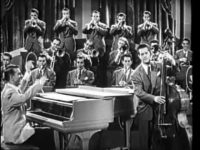
Stanley Newcomb Kenton (December 15, 1911 – August 25, 1979) was an American popular music and jazz artist. As a pianist, composer, arranger and band leader, he led an innovative and influential jazz orchestra for almost four decades. Though Kenton had several pop hits from the early 1940s into the 1960s, his music was always forward-looking. Kenton was also a pioneer in the field of jazz education, creating the Stan Kenton Jazz Camp in 1959 at Indiana University.
Shirley Bassey
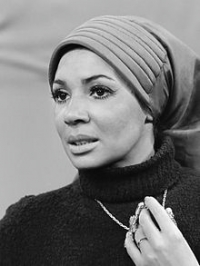
Dame Shirley Veronica Bassey, DBE (born 8 January 1937) is a Welsh singer whose career began in the mid-1950s. She is best known for recording the theme songs to the James Bond films Goldfinger (1964), Diamonds Are Forever (1971), and Moonraker (1979).
In 2000, Bassey was made a Dame by Queen Elizabeth II for services to the performing arts. In 1977 she received the Brit Award for Best British Female Solo Artist in the previous 25 years. Bassey has been called "one of the most popular female vocalists in Britain during the last half of the 20th century."
In 2000, Bassey was made a Dame by Queen Elizabeth II for services to the performing arts. In 1977 she received the Brit Award for Best British Female Solo Artist in the previous 25 years. Bassey has been called "one of the most popular female vocalists in Britain during the last half of the 20th century."
Jamie Cullum
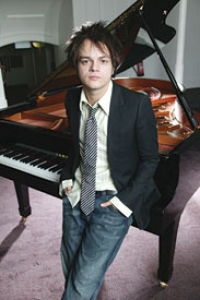
Jamie Cullum (born 20 August 1979) is an English pop and jazz-pop singer, songwriter, pianist, guitarist, and drummer.
Cullum was born at Romford Hospital in Essex, and educated at the independent fee-paying Grittleton House School and the sixth form at Sheldon School. Both are near Chippenham in Wiltshire. His mother, Yvonne, is a secretary of Anglo-Burmese origin, whose family settled in Wales after Burma's independence; his father, John Cullum, worked in finance. His paternal grandfather was a British Army officer, while his paternal grandmother was a Jewish refugee from Prussia who sang in Berlin nightclubs; Cullum has said that he sees her as his "cultural icon". He was brought up in Hullavington, Wiltshire but currently lives in North West London.
Cullum was born at Romford Hospital in Essex, and educated at the independent fee-paying Grittleton House School and the sixth form at Sheldon School. Both are near Chippenham in Wiltshire. His mother, Yvonne, is a secretary of Anglo-Burmese origin, whose family settled in Wales after Burma's independence; his father, John Cullum, worked in finance. His paternal grandfather was a British Army officer, while his paternal grandmother was a Jewish refugee from Prussia who sang in Berlin nightclubs; Cullum has said that he sees her as his "cultural icon". He was brought up in Hullavington, Wiltshire but currently lives in North West London.
Hillsong United

The Hillsong United band is an Australian rock and worship band, a part of Hillsong Church's youth ministry Hillsong United. Their music is a contemporary style of praise and worship tempered with mainstream rock.
Current members of the Hillsong United band include Jonathon Douglass (J.D.), Jadwin "Jad" Gillies, Holly Watson, Annie Garratt, Bec Gillies, and Michelle Fragar, daughter of Russell Fragar. Michael Guy Chislett plays guitar and Matthew Tennikoff plays bass guitar. Former original drummer Luke Munns made a transition from the drums to front the rock/indie band LUKAS. Popular New Zealand artist Brooke Fraser recently joined the band when she joined the church, first appearing on United We Stand.
The annual Hillsong United CD/DVD was recorded over many years during their October youth conference Encounterfest, with the album released in the first quarter of the following year. The 2007 album All of the Above was the first album to be fully studio recorded, containing videos of songs on the DVD. The band has toured in a number of countries, leading worship to thousands in North and South America, Europe and Asia.
Current members of the Hillsong United band include Jonathon Douglass (J.D.), Jadwin "Jad" Gillies, Holly Watson, Annie Garratt, Bec Gillies, and Michelle Fragar, daughter of Russell Fragar. Michael Guy Chislett plays guitar and Matthew Tennikoff plays bass guitar. Former original drummer Luke Munns made a transition from the drums to front the rock/indie band LUKAS. Popular New Zealand artist Brooke Fraser recently joined the band when she joined the church, first appearing on United We Stand.
The annual Hillsong United CD/DVD was recorded over many years during their October youth conference Encounterfest, with the album released in the first quarter of the following year. The 2007 album All of the Above was the first album to be fully studio recorded, containing videos of songs on the DVD. The band has toured in a number of countries, leading worship to thousands in North and South America, Europe and Asia.
Michael Jackson

Michael Joseph Jackson (August 29, 1958 – June 25, 2009) was an American singer, dancer and entertainer. Referred to as the King of Pop, he is the most commercially successful entertainer of all time, and one of the most influential. His contributions to music, dance and fashion, along with a much publicized personal life, made him a global figure in popular culture for over four decades.
Alongside his brothers, he made his debut as lead singer and youngest member of The Jackson 5 in 1964. He began his solo career in 1971. His 1982 album Thriller remains the best-selling album ever, with Off the Wall (1979), Bad (1987), Dangerous (1991) and HIStory (1995) also among the world's best-selling albums. He is widely credited with having transformed the music video from a promotional tool into an art form with videos for his songs such as "Billie Jean", "Beat It" and "Thriller" making him the first African American artist to amass a strong crossover following on MTV. With stage performances and music videos, Jackson popularized a number of physically complicated dance techniques, such as the robot and the moonwalk. His distinctive musical sound, vocal style, and choreography, is credited with stretching across and breaking down cultural, racial, economic, generational, and global barriers that has inspired countless pop, rock, R&B and hip hop artists.
One of the few artists to have been inducted into the Rock and Roll Hall of Fame twice, his other achievements feature multiple Guinness World Records—including the "Most Successful Entertainer of All Time"—15 Grammy Awards (including the "Living Legend Award" and the "Lifetime Achievement Award"), 26 American Music Awards (24 only as a solo artist, including one for "Artist of the Century")—more than any artist—, 17 number one singles in the US (including the four as a member of the Jackson 5), and estimated sales of up to 750 million records worldwide making him the world's best selling artist in history.
Jackson's personal relationships and life generated controversy for years. His changing appearance was noticed from the late 1970s onwards, with changes to his nose and to the color of his skin drawing media publicity. He was accused of child sexual abuse in 1993 though no charges were brought, and in 2005 he was tried and acquitted when the jury ruled him not guilty on all charges. He married twice, first in 1994 and again in 1996, and brought up three children, one born to a surrogate mother. While preparing for the This Is It concert tour in 2009, Jackson died at the age of 50 after suffering from cardiac arrest. He reportedly had been administered drugs such as propofol and lorazepam, and his death was ruled a homicide by the Los Angeles County coroner. His death triggered an outpouring of grief from around the world with his globally live broadcast memorial service attracting an audience of up to one billion people; as well as a huge surge in his album sales, resulting in him becoming the best selling artist of 2009 with sales in excess of 8.2 million in the United States where he became the first artist ever to have 4 of the top 20 best-selling albums in a single year, and 29 million albums globally, where he had an unprecedented 8 of the top 25 best-selling albums worldwide.
Alongside his brothers, he made his debut as lead singer and youngest member of The Jackson 5 in 1964. He began his solo career in 1971. His 1982 album Thriller remains the best-selling album ever, with Off the Wall (1979), Bad (1987), Dangerous (1991) and HIStory (1995) also among the world's best-selling albums. He is widely credited with having transformed the music video from a promotional tool into an art form with videos for his songs such as "Billie Jean", "Beat It" and "Thriller" making him the first African American artist to amass a strong crossover following on MTV. With stage performances and music videos, Jackson popularized a number of physically complicated dance techniques, such as the robot and the moonwalk. His distinctive musical sound, vocal style, and choreography, is credited with stretching across and breaking down cultural, racial, economic, generational, and global barriers that has inspired countless pop, rock, R&B and hip hop artists.
One of the few artists to have been inducted into the Rock and Roll Hall of Fame twice, his other achievements feature multiple Guinness World Records—including the "Most Successful Entertainer of All Time"—15 Grammy Awards (including the "Living Legend Award" and the "Lifetime Achievement Award"), 26 American Music Awards (24 only as a solo artist, including one for "Artist of the Century")—more than any artist—, 17 number one singles in the US (including the four as a member of the Jackson 5), and estimated sales of up to 750 million records worldwide making him the world's best selling artist in history.
Jackson's personal relationships and life generated controversy for years. His changing appearance was noticed from the late 1970s onwards, with changes to his nose and to the color of his skin drawing media publicity. He was accused of child sexual abuse in 1993 though no charges were brought, and in 2005 he was tried and acquitted when the jury ruled him not guilty on all charges. He married twice, first in 1994 and again in 1996, and brought up three children, one born to a surrogate mother. While preparing for the This Is It concert tour in 2009, Jackson died at the age of 50 after suffering from cardiac arrest. He reportedly had been administered drugs such as propofol and lorazepam, and his death was ruled a homicide by the Los Angeles County coroner. His death triggered an outpouring of grief from around the world with his globally live broadcast memorial service attracting an audience of up to one billion people; as well as a huge surge in his album sales, resulting in him becoming the best selling artist of 2009 with sales in excess of 8.2 million in the United States where he became the first artist ever to have 4 of the top 20 best-selling albums in a single year, and 29 million albums globally, where he had an unprecedented 8 of the top 25 best-selling albums worldwide.
Klaus Badelt

Klaus Badelt (born 1968) is a German composer, best known for composing film scores.
Badelt was born in Frankfurt, Germany. He started his musical career composing for many successful movies and commercials in his homeland. In 1998, Oscar-winning film composer Hans Zimmer invited Badelt to work at Media Ventures in Santa Monica, his studio co-owned by Jay Rifkin. Since then, Badelt has been working on a number of his own film and television projects such as The Time Machine and K-19: The Widowmaker. He has also collaborated with other Media Ventures composers, such as Harry Gregson-Williams, John Powell, and Zimmer.
While collaborating with Zimmer, Badelt has contributed to the Oscar-nominated scores for The Thin Red Line and The Prince of Egypt, as well as writing music for many well known directors including Ridley Scott, Tony Scott, Terrence Mallick, John Woo, Kathryn Bigelow, Jeffrey Katzenberg, Tom Cruise, Sean Penn, Gore Verbinski, and Steven Spielberg.
Badelt co-produced the score to Hollywood box office hit Gladiator, directed by Ridley Scott, as well as writing portions of the score with singer/composer Lisa Gerrard. Having contributed music to Gladiator, Mission: Impossible 2 and Michael Kamen's score for X-Men, Badelt was involved in the three most successful movies in 2000. Badelt also collaborated with Zimmer on other successful films, such as The Pledge, and 2001 blockbusters Hannibal and Pearl Harbor. One of his more famous - and more popular - scores is the score to the 2003 film Pirates of the Caribbean: The Curse of the Black Pearl.
Among Badelt's most critically celebrated scores are the Chinese fantasy film The Promise and Dreamworks' remake of The Time Machine, the latter which earned him the Discovery of the Year Award at the World Soundtrack Awards 2003.
Badelt was born in Frankfurt, Germany. He started his musical career composing for many successful movies and commercials in his homeland. In 1998, Oscar-winning film composer Hans Zimmer invited Badelt to work at Media Ventures in Santa Monica, his studio co-owned by Jay Rifkin. Since then, Badelt has been working on a number of his own film and television projects such as The Time Machine and K-19: The Widowmaker. He has also collaborated with other Media Ventures composers, such as Harry Gregson-Williams, John Powell, and Zimmer.
While collaborating with Zimmer, Badelt has contributed to the Oscar-nominated scores for The Thin Red Line and The Prince of Egypt, as well as writing music for many well known directors including Ridley Scott, Tony Scott, Terrence Mallick, John Woo, Kathryn Bigelow, Jeffrey Katzenberg, Tom Cruise, Sean Penn, Gore Verbinski, and Steven Spielberg.
Badelt co-produced the score to Hollywood box office hit Gladiator, directed by Ridley Scott, as well as writing portions of the score with singer/composer Lisa Gerrard. Having contributed music to Gladiator, Mission: Impossible 2 and Michael Kamen's score for X-Men, Badelt was involved in the three most successful movies in 2000. Badelt also collaborated with Zimmer on other successful films, such as The Pledge, and 2001 blockbusters Hannibal and Pearl Harbor. One of his more famous - and more popular - scores is the score to the 2003 film Pirates of the Caribbean: The Curse of the Black Pearl.
Among Badelt's most critically celebrated scores are the Chinese fantasy film The Promise and Dreamworks' remake of The Time Machine, the latter which earned him the Discovery of the Year Award at the World Soundtrack Awards 2003.
Charles Gounod

Charles-François Gounod (/ɡuːˈnoʊ/; French: ; 17 June 1818 – 17 or 18 October 1893) was a French composer, best known for his Ave Maria, based on a work by Bach, as well as his opera Faust. Another opera by Gounod that is still performed today is Roméo et Juliette.
Gounod died at Saint-Cloud in 1893, after a final revision of his twelve operas. His funeral took place ten days later at the Church of the Madeleine, with Camille Saint-Saëns playing the organ and Gabriel Fauré conducting. He was buried at the Cimetière d'Auteuil in Paris.
Gounod died at Saint-Cloud in 1893, after a final revision of his twelve operas. His funeral took place ten days later at the Church of the Madeleine, with Camille Saint-Saëns playing the organ and Gabriel Fauré conducting. He was buried at the Cimetière d'Auteuil in Paris.
Beatles

The Beatles were an English rock band formed in Liverpool in 1960. Their best-known lineup, consisting of John Lennon, Paul McCartney, George Harrison, and Ringo Starr, became the greatest and most influential act of the rock era, introducing more innovations into popular music than any other rock band of the 20th century. Rooted in skiffle and 1950s rock and roll, the Beatles later utilized several genres, ranging from pop ballads to psychedelic rock, often incorporating classical elements in innovative ways. In the early 1960s, their enormous popularity first emerged as "Beatlemania", but as their songwriting grew in sophistication, they came to be perceived by many fans and cultural observers as an embodiment of the ideals shared by the era's sociocultural revolutions.
The band built their reputation playing clubs in Liverpool and Hamburg over a three-year period from 1960. Manager Brian Epstein moulded them into a professional act and producer George Martin enhanced their musical potential. They gained popularity in the United Kingdom after their first modest hit, "Love Me Do", in late 1962. They acquired the nickname the "Fab Four" as Beatlemania grew in Britain over the following year, and by early 1964 they had become international stars, leading the "British Invasion" of the United States pop market. From 1965 on, the Beatles produced what many critics consider their finest material, including the innovative and widely influential albums Rubber Soul (1965), Revolver (1966), Sgt Pepper's Lonely Hearts Club Band (1967), The Beatles (1968), and Abbey Road (1969). After their break-up in 1970, they each enjoyed successful musical careers. Lennon was shot and killed in December 1980, and Harrison died of lung cancer in November 2001. McCartney and Starr remain musically active.
The band built their reputation playing clubs in Liverpool and Hamburg over a three-year period from 1960. Manager Brian Epstein moulded them into a professional act and producer George Martin enhanced their musical potential. They gained popularity in the United Kingdom after their first modest hit, "Love Me Do", in late 1962. They acquired the nickname the "Fab Four" as Beatlemania grew in Britain over the following year, and by early 1964 they had become international stars, leading the "British Invasion" of the United States pop market. From 1965 on, the Beatles produced what many critics consider their finest material, including the innovative and widely influential albums Rubber Soul (1965), Revolver (1966), Sgt Pepper's Lonely Hearts Club Band (1967), The Beatles (1968), and Abbey Road (1969). After their break-up in 1970, they each enjoyed successful musical careers. Lennon was shot and killed in December 1980, and Harrison died of lung cancer in November 2001. McCartney and Starr remain musically active.
Steve Swallow
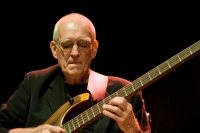
Steve Swallow (born October 4, 1940) is a jazz fusion bassist and composer noted for his collaborations with Jimmy Giuffre, Gary Burton, and Carla Bley. He was one of the first jazz double bassists to switch entirely to electric bass guitar.
Glenn Miller Orchestra
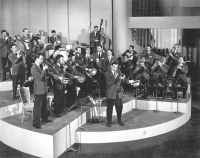
This article is about the band that Glenn Miller fronted. For the band that performed after his disappearance, see Glenn Miller Orchestra (1956–present).
Glenn Miller and His Orchestra
Glenn Miller Band.jpg
Glenn Miller and His Orchestra, on the set of Sun Valley Serenade, 1941
Background information
Genres Dance band, Swing
Years active April 1938 – September 1942
Labels
Bluebird Victor
Website www.glennmiller.com
Past members see members section
Glenn Miller and His Orchestra was an American swing dance band formed by Glenn Miller in 1938. Arranged around a clarinet and tenor saxophone playing melody, and three other saxophones playing harmony, the band became the most popular and commercially successful dance orchestra of the Swing era and one of the greatest singles charting acts of the 20th century.
Miller began professionally recording in New York City as a sideman in the Hot jazz era of the late 1920s. With the arrival of virtuoso trombonists Jack Teagarden and Tommy Dorsey, Miller focused more on developing his arrangement skills. Writing for contemporaries and future stars such as Artie Shaw, and Benny Goodman, Miller gained prowess as an arranger by working in a variety of settings. Later, Miller largely improved his arranging and writing skills by studying under music theorist Joseph Schillinger.
In February 1937, Miller started an orchestra that briefly made records for Decca. With this group, Miller used an arrangement he wrote for British bandleader Ray Noble's American band in an attempt to form a clarinet-reed sound. This style developed over time, and eventually became known as the Glenn Miller sound. Frustrated with his agency over playing inconsistent bookings and lacking broad radio exposure, Miller gave the band notice in December 1937. Less than three months later, he was looking for members and forming a new band.
Miller began a partnership with Eli Oberstein, which led directly to a contract with Victor subsidiary Bluebird Records. Gaining notoriety at such engagements as the Paradise Restaurant and Frank Dailey–owned Meadowbrook and their corresponding nationwide broadcasts, Miller struck enormous popularity playing the Glen Island Casino in the summer of 1939. From late 1939 to mid-1942, Miller was the number-one band in the country, with few true rivals. Only Harry James' band began to equal Miller's in popularity as he wound down his career in the wake of the Second World War. The AFM strike prevented Miller from making any new recordings in the last two months of his band's existence, and they formally disbanded at the end of September 1942.
Miller's short-term chart successes have seldom been duplicated and his group's unprecedented dominance of early Your Hit Parade and Billboard singles charts, resulting in 16 number-one singles and 69 Top Ten hits, foreshadowed future record-breaking chart acts such as Elvis Presley and The Beatles.
Contents
1 Musical success
1.1 Beginnings
1.2 Glen Island Casino and Meadowbrook
1.3 Nationwide popularity
2 Radio success
3 Chart success
4 Past members
5 Discography
5.1 Singles
6 See also
7 References
8 External links
Musical success
Beginnings
By March 1938, Glenn was planning to form a new group. The newly reformed band featured several longtime associates of Miller. From his first orchestra, Miller invited back Hal McIntyre, and hired Paul Tanner, Wilbur Schwartz, Ray Eberle (who was the younger brother of Jimmy Dorsey's vocalist Bob Eberly), and his old friend Chummy MacGregor. Miller's perseverance, business expertise, combined with a penchant for showmanship and musical taste, provided the faith for financiers Mike Nidorf and Cy Shribman. Miller used the 'clarinet-lead' sound as the foundation for his new band, and this caught the attention of students at Northeastern campuses. They opened on April 16, 1938, at Raymor Ballroom in Boston. When the band reached New York, they were billed below Freddie Fisher and His Schnickelfritzers, a dance band comedy routine. From Vincent Lopez's group came Marion Hutton, who added enthusiasm and energy in her performances. On September 7, 1938, the band made their first recordings, "My Reverie", "King Porter Stomp" and "By the Waters of Minnetonka", in two parts. Keeping up radio dates, Miller was only booked for 1 more session the rest of the year.
Glen Island Casino and Meadowbrook
In March 1939, the Glenn Miller Orchestra was given its big break, when they were chosen to play the summer season at the prestigious Glen Island Casino located on the north shore of Long Island Sound in New Rochelle, New York. Frank Dailey, manager of The Meadowbrook Ballroom in Cedar Grove, New Jersey, immediately booked the band for a four-week stay in March and April, before Glen Island. The band was well-received and within days Dailey picked up a three-week extension offer. During this time, Bluebird recording dates became more common and Glenn added drummer Maurice Purtill and trumpeter Dale "Mickey" McMickle to stabilize personnel. Opening at Glen Island on May 17, 1939, the casino's radio broadcast antenna ensured the Miller band was heard around the country. In late August, the end of their summer season, they had nationwide attention.
George T. Simon, writer and one-time drummer for Miller, spoke of the Glen Island broadcasts:
Glen Island was the prestige place for people who listened to bands on radio. The band's first semi hit, "Little Brown Jug", came out just when it opened at Glen Island. That helped. And the clarinet lead in Glenn's arrangements was such a romantic sound! It caught the public fancy during this exposure. Miller began ending his broadcasts from Glen Island with his "Something Old, Something New" medleys. But the most important thing for Glenn's success was that he recorded "In the Mood" while he was at the casino. That made him the Michael Jackson of his day.
Nationwide popularity
Capitalizing on newfound popularity, Miller decided to add a trombone and a trumpet, giving the band a fuller sound. On April 4, 1939, Miller and his orchestra recorded "Moonlight Serenade". Considered one of the top songs of the swing era, and Miller's best composition, it soon became the theme song to start and end all of his radio performances.
Miller's most popular track "In the Mood" was recorded August 1, 1939. Famous for its opening and bass riffs as well as its "dueling" saxophone solos between Tex Beneke and Al Klink, the song hit number one on the Billboard charts, staying for a total of 30 weeks. Joe Garland compiled the song from riffs he'd heard in other songs, and is credited on the label. Elements of "In the Mood" can be found in earlier jazz recordings, such as Jimmy O'Bryant's "Clarinet Getaway", Wingy Manone's "Tar Paper Stomp", and Fletcher Henderson's "Hot and Anxious." Garland put these pieces together and initially offered the song, in a six-minute form, to Artie Shaw. Despite playing it for radio broadcast, Shaw found no success with it in this form. Miller purchased the song in June 1939 and asked Eddie Durham to arrange it for his orchestra, and Miller made final tweaks in Victor studios. In a 2000 interview for npr, trombonist Paul Tanner remembered recording the song and playing it live:
He would say, "You fellas do this, and you fellas do that, and let's hear it once." And then, "We're gonna cut from this spot to this spot in the arrangement, and in here we're gonna put a trumpet solo. And in this spot and this spot we're gonna cut way down here and we're gonna have the two saxophones have a little battle in there," and decided to make cuts. And then at the end, Alice , if you know the arrangement, at the end there are all those false endings that go on, and it kept getting softer and softer until Glenn would give the drummer a clue and he would hit the cowbell and then we would know that the next time we were to come on very loud. And the dancers just loved it. He tried it out on the dances at the Glen Island Casino, and they loved it. They couldn't figure out how we knew when to come in loud. But, you know, I told them, "Well, we have a sixth sense of that sort of thing." But actually, what happened is the drummer hit the cowbell, and we knew the next time was loud. And this was all Glenn's doing.
On February 5, 1940, Miller recorded "Tuxedo Junction", which hit number one and reportedly sold 115,000 copies within the first week of release, and placed 7th overall for the National Hit Parade that year. Bob Eberly said that it "sold 90,000 copies in the first week, at a time when 25,000 was considered a great seller". In April, the band chant track "Pennsylvania 6-5000", referencing the phone number for the Hotel Pennsylvania, which housed the Café Rouge, a common engagement and broadcasting spot for the band, was released and it too became an instant swing standard.
On January 1, 1941, following tensions regarding licensing fees, radio networks banned ASCAP songs from live performance. Miller had to work to reform his radio programs for BMI published tunes, temporarily switching his theme to "Slumber Song". In early 1941, Marion Hutton left the band to go on maternity leave. In the meantime, Miller needed an additional female vocalist, and he offered Dorothy Claire, then with Bobby Byrne's band, twice her salary. Claire went to work for Miller, despite her signature on a three-year contract with Byrne in November 1940, and Miller ignored Byrne's wishes for compensation. Byrne then launched a $25,000 lawsuit against the Miller orchestra's business dealings. Miller met with Byrne in Columbus, Ohio sometime in early March and settled the dispute – Claire went back to working with Byrne's band. Miller soon hired The Modernaires from Paul Whiteman, who was disbanding his orchestra. Still in need of a female vocalist, the wife of Modernaire Hal Dickinson, Paula Kelly, who had sung previously with Al Donahue, stepped up to fill in the role. The signing of the Modernaires significantly benefitted the Miller organization. Hip and popular with young listeners, the Modernaires' vocal range added a new dimension to Miller's recordings.
In late March, Miller and his orchestra began work on their first motion picture, Sun Valley Serenade. Previously, swing films such as Hollywood Hotel with Benny Goodman's orchestra had only featured bands for song performances; Miller reportedly insisted, perhaps even to the extent of contract clauses, that the plot of Sun Valley revolve around the band rather than only feature them. Harry Warren and Mack Gordon were commissioned to write songs for the film. The Miller band filmed and recorded an extended song-and-dance number featuring the Nicholas Brothers for what was soon to be its biggest selling record, surprise hit "Chattanooga Choo Choo". Despite criticism of the plot, Sun Valley Serenade was received with general positivity from critics, and Miller earned praise for his band's role in the film, with Barry Ulanov writing for Metronome:
Miller comes across as a convincing band leader, and, even more important, a convincing human being in this film. He’s on mostly for music, but most of the film is music and the dozen or so reels are a better showcase for the Glenn Miller band than they are for the Sonja Henie torso and limbs, with and without skates. Never has a movie made more of a popular band and never has a movie featuring such an organization presented its music so tastefully... Pictorially, Trigger Alpert and Maurice Purtill take the honors. Trigger hops around like mad and Maurice looks like the movies’ idea of a swing drummer, all right. They stay within the bounds of good taste, however ... the story is believable, and happily centers around the band, so that the whole thing is a triumph for Glenn Miller and the band.
Billboard top 10 chart for January 24, 1942, where Glenn Miller and His Orchestra hold five of the slots.
In October, ASCAP and the radio networks agreed on a new rate, and the band could finally play "Chattanooga" and their other songs on radio. W. Wallace Early, the manager of record sales for RCA Victor and Bluebird Records, presented the first ever gold record to Miller on February 10, 1942, saying:
It's a pleasure to be here tonight. And speaking of RCA Victor, we're mighty proud of that Chattanooga Choo Choo, and the man that made the record, Glenn Miller. You see it's been a long time – 15 years in fact – since any record has sold a million copies. And Chattanooga Choo Choo certainly put on steam and breezed right through that million mark by over 200,000 pressings. And we decided that Glenn should get a trophy. The best one we could think of is a gold record of Chattanooga. And now Glenn, it's yours – with the best wishes of RCA Victor Bluebird Records.
After the Pearl Harbor attack, Miller began incorporating more patriotic themes into his radio shows and recordings.
In early 1942, the band was upgraded from Bluebird to full-price Victor Records. Following very closely in the footsteps of its predecessor, the Miller band started work on their second film, Orchestra Wives in March. Once again, Gordon and Warren were recalled to compose the songs. The previous year, both had composed "At Last" but couldn't place it into Sun Valley Serenade. They worked over the arrangement, and it was displayed prominently in Orchestra Wives. Years later, it became a standard when recorded by Etta James. Akin to "Chattanooga", "(I've Got a Gal In) Kalamazoo" was filmed as a song and dance number featuring the Nicholas Brothers and also sold a million pressings, with Billboard ranking it among the most popular records of the year.
In mid–July, Miller and the band recorded thirteen sides, as James Petrillo, chief of the musicians' union, embarked on a 28-month recording ban. The strike prevented Miller from making additional records in his career, although Victor slowly released the last set of tracks, with "That Old Black Magic" hitting number one in May 1943, over eight months after his band ceased to exist.
Miller began privately sending letters to the Armed Forces in attempts to lead a modern military band. Accepted into the United States Navy and later transferred to the Army Air Forces, in early September he broke the news to the band and later that month they played their last radio shows. Miller surrendered his Chesterfield radio slot to Harry James.
Radio success
Radio played a pivotal role in the success of Miller and His Orchestra. Featured heavily on the format during their existence, many of their earlier programs from such venues as the Paradise Restaurant, Glen Island and the Meadowbrook Ballroom used remote connections to the National Broadcasting Company, on both NBC–Red and NBC–Blue.
The makers of Chesterfield Cigarettes hosted a half-hour radio show on CBS that featured King of Jazz Paul Whiteman. Whiteman decided to retire and recommended Glenn as a replacement. On December 27, 1939, Miller took over the program as Chesterfield Moonlight Serenade. During the first 13 weeks, The Andrews Sisters were featured as Chesterfield were worried over whether Miller could sustain his popularity. Their fear subsided, and the program, reformatted for 15 minutes, aired Tuesday, Wednesday and Thursday nights at 10:15pm. Miller and his band held the slot until their disbandment in 1942.
In 1940, the band broadcast from the first time from the Café Rouge at the Hotel Pennsylvania, soon to become a regular booking and a host of long-term engagements. By then, the Miller band had several NBC sustaining broadcasts in addition to three CBS programs, reaching American homes 6–7 days a week. In August, Miller's orchestra had an hour-long program on NBC–Blue, Glenn Miller's Sunset Serenade featuring prizes Miller paid for out-of-pocket. A review in Billboard commented, "Unusual length of the program allows Miller to display all the top items in his library."
Chart success
According to Paul Albone, of the 121 singles by Glenn Miller and His Orchestra that made the charts, 69 were Top Ten hits, and 16 reached number-one. In just a 4-year career, Miller and His Orchestra's songs spent a cumulative total of 664 weeks, nearly thirteen years, on the charts, 79 of which were at the number-one position. Miller also has the distinction of three posthumous albums reaching number-one on Billboard charts: Glenn Miller in 1945, its follow-up in 1947, and his original recordings repackaged for the release of The Glenn Miller Story in 1954.
Past members
Ray Anthony, who played trumpet with the band from 1940 to 1941, is the last surviving member as of 2019.
Discography
See also: Glenn Miller discography
Singles
Million-selling singles:
1939: "Little Brown Jug"
1939: "Moonlight Serenade"
1939: "In the Mood"
1940: "Tuxedo Junction"
1940: "Pennsylvania 6-5000"
1941: "Chattanooga Choo Choo"
1941: "A String of Pearls"
1941: "Moonlight Cocktail"
1942: "American Patrol"
1942: "(I've Got a Gal In) Kalamazoo"
See also
Glenn Miller
Swing music
Bandleader
Big band
References
"A Portrait of Glenn Miller" (PDF). www.colorado.edu. Glenn Miller Archive.
Gilliland, John (1994). Pop Chronicles the 40s: The Lively Story of Pop Music in the 40s (audiobook). ISBN 978-1-55935-147-8. OCLC 31611854. Tape 2, side A.
"Top Ten Hits 1939-1943" (PDF). colorado.edu. Glenn Miller Archive. September 2017. Retrieved October 12, 2018.
"Captain Swing - Glenn Miller - America in WWII magazine". www.americainwwii.com.
"A Bluebird Reverie – The First RCA Session". 1 April 2014.
Settlemier, Tyrone. "The Online 78 rpm Discographical Project". www.78discography.com.
"POP/JAZZ; GLENN MILLER SOUND OF 1939 AT GLEN ISLAND CASINO".
"Glenn Miller Orchestra – History". glennmillerorchestra.com.
http://ww Archived 2013-07-12 at the Wayback Machine w.glennmiller.com/index.php
"Army Band Hits High Note With Community".
Tsort. "Song title 150 - In the Mood". tsort.info.
""In the Mood"—Glenn Miller (1939)" (PDF). Library of Congress.
Spragg, Dennis. "In the Mood" (PDF). www.colorado.edu. Glenn Miller Archive.
"'In the Mood'". National Public Radio.
Simon, George T. Glenn Miller and His Orchestra. NY: Crowell, 1974.
Spragg, Dennis. "Sun Valley Serenade 75th Anniversary Commemoration" (PDF). Glenn Miller Archive.
Crowther, Bosley. "Sonia Henie in 'Sun Valley Serenade,' a Sparkling and Melodious Outdoor Picture, at the Roxy". The New York Times.
Murrells, Joseph (1978). The Book of Golden Discs (2nd ed.). London: Barrie and Jenkins Ltd. p. 4. ISBN 0-214-20512-6.
"Radio Recordings" (PDF). colorado.edu. Glenn Miller Archive.
Carter, Dick (January 3, 1942). "On the Air: Glenn Miller". Billboard. Retrieved 26 October 2014.
Whitburn, Joel. Pop Memories (1900-1940). Record Research.
Whitburn, Joel (2015). Pop Hits Singles and Albums, 1940-1954. Record Research. ISBN 978-0-89820-198-7.
Popa, Christopher. "Record Sales". Big Band Library.
External links
Wikimedia Commons has media related to Glenn Miller Orchestra.
Website of past vocalist Eileen Burns
YouTube Videos from 1983 GMO US and Japan Tour
vte
Glenn Miller and His Orchestra
Discography Timeline of members, 1938–1942
Number one hits
1939
"Wishing (Will Make It So)" "Stairway to the Stars" "Moon Love" "Over the Rainbow" "The Man With the Mandolin" "Blue Orchids" "In the Mood"
1940
"Tuxedo Junction" "The Woodpecker Song"
1941
"Song of the Volga Boatmen" "Chattanooga Choo Choo" "Elmer's Tune"
1942
"A String of Pearls" "Moonlight Cocktail" "(I've Got a Gal In) Kalamazoo"
1943
"That Old Black Magic"
Albums
Up Swing (1944) Smoke Rings (1944) Glenn Miller (1945) Glenn Miller Masterpieces, Volume II (1947) Glenn Miller Plays Selections From the Film "The Glenn Miller Story" (1954) The Glenn Miller Carnegie Hall Concert (1958) Pure Gold (1975)
Members
Vocalists
Marion Hutton Ray Eberle Tex Beneke Jack Lathrop Ernie Caceres Kay Starr Dorothy Claire Paula Kelly The Modernaires Skip Nelson
Musicians
Al Klink Al Mastren Paul Tanner Toby Tyler Tommy Mack Frank D’Annolfo Howard Gibeling Jimmy Priddy Wilbur Schwartz Stanley Aronson Hal McIntyre Tex Beneke Ernie Caceres Jimmy Abato Gabe Galinas Hal Tennyson Benny Feman Babe Russin Skip Martin Johnny Austin Lou Mucci Bob Price Charlie Hill Legh Knowles Mickey McMickle Clyde Hurley Johnny Best Zeke Zarchy Charles Frankhauser Billy May Ray Anthony Alec Fila Bill Graham Steve Lipkins Allan Reuss Arthur Ens Dick Fisher Jack Lathrop Bobby Hackett Bill Conway Chummy MacGregor Bob Spangler Cody Sandifer Frankie Carlson Maurice Purtill Rollie Bundock Tony Carlson Trigger Alpert Doc Goldberg
Arrangers
Jerry Gray Bill Finegan Glenn Miller Billy May
Composers
Glenn Miller Harry Warren Mack Gordon
Army Air Force
band alumni
The Crew Chiefs Addison Collins Jr. Johnny Desmond Peanuts Hucko Jack Lathrop Norman Leyden Ray McKinley Artie Malvin Ralph Patt Mel Powell George Siravo Charlie Spivak
Media
Films
Sun Valley Serenade (1941) Orchestra Wives (1942) The Glenn Miller Story (1954)
Publications
125 Jazz Breaks for Trombone (1927) Glenn Miller's Method for Orchestral Arranging (1943)
Related
List of songs written by Glenn Miller Dorsey Brothers Orchestra The Glenn Miller Story (Decca) (1954) Glenn Miller Orchestra (1956–present) Glenn Miller Time
Authority control Edit this at Wikidata
ISNI: 0000 0001 1536 8834 MusicBrainz: 9b87c1f6-23ae-469b-b710-ea5da2d3f848
Glenn Miller and His Orchestra
Glenn Miller Band.jpg
Glenn Miller and His Orchestra, on the set of Sun Valley Serenade, 1941
Background information
Genres Dance band, Swing
Years active April 1938 – September 1942
Labels
Bluebird Victor
Website www.glennmiller.com
Past members see members section
Glenn Miller and His Orchestra was an American swing dance band formed by Glenn Miller in 1938. Arranged around a clarinet and tenor saxophone playing melody, and three other saxophones playing harmony, the band became the most popular and commercially successful dance orchestra of the Swing era and one of the greatest singles charting acts of the 20th century.
Miller began professionally recording in New York City as a sideman in the Hot jazz era of the late 1920s. With the arrival of virtuoso trombonists Jack Teagarden and Tommy Dorsey, Miller focused more on developing his arrangement skills. Writing for contemporaries and future stars such as Artie Shaw, and Benny Goodman, Miller gained prowess as an arranger by working in a variety of settings. Later, Miller largely improved his arranging and writing skills by studying under music theorist Joseph Schillinger.
In February 1937, Miller started an orchestra that briefly made records for Decca. With this group, Miller used an arrangement he wrote for British bandleader Ray Noble's American band in an attempt to form a clarinet-reed sound. This style developed over time, and eventually became known as the Glenn Miller sound. Frustrated with his agency over playing inconsistent bookings and lacking broad radio exposure, Miller gave the band notice in December 1937. Less than three months later, he was looking for members and forming a new band.
Miller began a partnership with Eli Oberstein, which led directly to a contract with Victor subsidiary Bluebird Records. Gaining notoriety at such engagements as the Paradise Restaurant and Frank Dailey–owned Meadowbrook and their corresponding nationwide broadcasts, Miller struck enormous popularity playing the Glen Island Casino in the summer of 1939. From late 1939 to mid-1942, Miller was the number-one band in the country, with few true rivals. Only Harry James' band began to equal Miller's in popularity as he wound down his career in the wake of the Second World War. The AFM strike prevented Miller from making any new recordings in the last two months of his band's existence, and they formally disbanded at the end of September 1942.
Miller's short-term chart successes have seldom been duplicated and his group's unprecedented dominance of early Your Hit Parade and Billboard singles charts, resulting in 16 number-one singles and 69 Top Ten hits, foreshadowed future record-breaking chart acts such as Elvis Presley and The Beatles.
Contents
1 Musical success
1.1 Beginnings
1.2 Glen Island Casino and Meadowbrook
1.3 Nationwide popularity
2 Radio success
3 Chart success
4 Past members
5 Discography
5.1 Singles
6 See also
7 References
8 External links
Musical success
Beginnings
By March 1938, Glenn was planning to form a new group. The newly reformed band featured several longtime associates of Miller. From his first orchestra, Miller invited back Hal McIntyre, and hired Paul Tanner, Wilbur Schwartz, Ray Eberle (who was the younger brother of Jimmy Dorsey's vocalist Bob Eberly), and his old friend Chummy MacGregor. Miller's perseverance, business expertise, combined with a penchant for showmanship and musical taste, provided the faith for financiers Mike Nidorf and Cy Shribman. Miller used the 'clarinet-lead' sound as the foundation for his new band, and this caught the attention of students at Northeastern campuses. They opened on April 16, 1938, at Raymor Ballroom in Boston. When the band reached New York, they were billed below Freddie Fisher and His Schnickelfritzers, a dance band comedy routine. From Vincent Lopez's group came Marion Hutton, who added enthusiasm and energy in her performances. On September 7, 1938, the band made their first recordings, "My Reverie", "King Porter Stomp" and "By the Waters of Minnetonka", in two parts. Keeping up radio dates, Miller was only booked for 1 more session the rest of the year.
Glen Island Casino and Meadowbrook
In March 1939, the Glenn Miller Orchestra was given its big break, when they were chosen to play the summer season at the prestigious Glen Island Casino located on the north shore of Long Island Sound in New Rochelle, New York. Frank Dailey, manager of The Meadowbrook Ballroom in Cedar Grove, New Jersey, immediately booked the band for a four-week stay in March and April, before Glen Island. The band was well-received and within days Dailey picked up a three-week extension offer. During this time, Bluebird recording dates became more common and Glenn added drummer Maurice Purtill and trumpeter Dale "Mickey" McMickle to stabilize personnel. Opening at Glen Island on May 17, 1939, the casino's radio broadcast antenna ensured the Miller band was heard around the country. In late August, the end of their summer season, they had nationwide attention.
George T. Simon, writer and one-time drummer for Miller, spoke of the Glen Island broadcasts:
Glen Island was the prestige place for people who listened to bands on radio. The band's first semi hit, "Little Brown Jug", came out just when it opened at Glen Island. That helped. And the clarinet lead in Glenn's arrangements was such a romantic sound! It caught the public fancy during this exposure. Miller began ending his broadcasts from Glen Island with his "Something Old, Something New" medleys. But the most important thing for Glenn's success was that he recorded "In the Mood" while he was at the casino. That made him the Michael Jackson of his day.
Nationwide popularity
Capitalizing on newfound popularity, Miller decided to add a trombone and a trumpet, giving the band a fuller sound. On April 4, 1939, Miller and his orchestra recorded "Moonlight Serenade". Considered one of the top songs of the swing era, and Miller's best composition, it soon became the theme song to start and end all of his radio performances.
Miller's most popular track "In the Mood" was recorded August 1, 1939. Famous for its opening and bass riffs as well as its "dueling" saxophone solos between Tex Beneke and Al Klink, the song hit number one on the Billboard charts, staying for a total of 30 weeks. Joe Garland compiled the song from riffs he'd heard in other songs, and is credited on the label. Elements of "In the Mood" can be found in earlier jazz recordings, such as Jimmy O'Bryant's "Clarinet Getaway", Wingy Manone's "Tar Paper Stomp", and Fletcher Henderson's "Hot and Anxious." Garland put these pieces together and initially offered the song, in a six-minute form, to Artie Shaw. Despite playing it for radio broadcast, Shaw found no success with it in this form. Miller purchased the song in June 1939 and asked Eddie Durham to arrange it for his orchestra, and Miller made final tweaks in Victor studios. In a 2000 interview for npr, trombonist Paul Tanner remembered recording the song and playing it live:
He would say, "You fellas do this, and you fellas do that, and let's hear it once." And then, "We're gonna cut from this spot to this spot in the arrangement, and in here we're gonna put a trumpet solo. And in this spot and this spot we're gonna cut way down here and we're gonna have the two saxophones have a little battle in there," and decided to make cuts. And then at the end, Alice , if you know the arrangement, at the end there are all those false endings that go on, and it kept getting softer and softer until Glenn would give the drummer a clue and he would hit the cowbell and then we would know that the next time we were to come on very loud. And the dancers just loved it. He tried it out on the dances at the Glen Island Casino, and they loved it. They couldn't figure out how we knew when to come in loud. But, you know, I told them, "Well, we have a sixth sense of that sort of thing." But actually, what happened is the drummer hit the cowbell, and we knew the next time was loud. And this was all Glenn's doing.
On February 5, 1940, Miller recorded "Tuxedo Junction", which hit number one and reportedly sold 115,000 copies within the first week of release, and placed 7th overall for the National Hit Parade that year. Bob Eberly said that it "sold 90,000 copies in the first week, at a time when 25,000 was considered a great seller". In April, the band chant track "Pennsylvania 6-5000", referencing the phone number for the Hotel Pennsylvania, which housed the Café Rouge, a common engagement and broadcasting spot for the band, was released and it too became an instant swing standard.
On January 1, 1941, following tensions regarding licensing fees, radio networks banned ASCAP songs from live performance. Miller had to work to reform his radio programs for BMI published tunes, temporarily switching his theme to "Slumber Song". In early 1941, Marion Hutton left the band to go on maternity leave. In the meantime, Miller needed an additional female vocalist, and he offered Dorothy Claire, then with Bobby Byrne's band, twice her salary. Claire went to work for Miller, despite her signature on a three-year contract with Byrne in November 1940, and Miller ignored Byrne's wishes for compensation. Byrne then launched a $25,000 lawsuit against the Miller orchestra's business dealings. Miller met with Byrne in Columbus, Ohio sometime in early March and settled the dispute – Claire went back to working with Byrne's band. Miller soon hired The Modernaires from Paul Whiteman, who was disbanding his orchestra. Still in need of a female vocalist, the wife of Modernaire Hal Dickinson, Paula Kelly, who had sung previously with Al Donahue, stepped up to fill in the role. The signing of the Modernaires significantly benefitted the Miller organization. Hip and popular with young listeners, the Modernaires' vocal range added a new dimension to Miller's recordings.
In late March, Miller and his orchestra began work on their first motion picture, Sun Valley Serenade. Previously, swing films such as Hollywood Hotel with Benny Goodman's orchestra had only featured bands for song performances; Miller reportedly insisted, perhaps even to the extent of contract clauses, that the plot of Sun Valley revolve around the band rather than only feature them. Harry Warren and Mack Gordon were commissioned to write songs for the film. The Miller band filmed and recorded an extended song-and-dance number featuring the Nicholas Brothers for what was soon to be its biggest selling record, surprise hit "Chattanooga Choo Choo". Despite criticism of the plot, Sun Valley Serenade was received with general positivity from critics, and Miller earned praise for his band's role in the film, with Barry Ulanov writing for Metronome:
Miller comes across as a convincing band leader, and, even more important, a convincing human being in this film. He’s on mostly for music, but most of the film is music and the dozen or so reels are a better showcase for the Glenn Miller band than they are for the Sonja Henie torso and limbs, with and without skates. Never has a movie made more of a popular band and never has a movie featuring such an organization presented its music so tastefully... Pictorially, Trigger Alpert and Maurice Purtill take the honors. Trigger hops around like mad and Maurice looks like the movies’ idea of a swing drummer, all right. They stay within the bounds of good taste, however ... the story is believable, and happily centers around the band, so that the whole thing is a triumph for Glenn Miller and the band.
Billboard top 10 chart for January 24, 1942, where Glenn Miller and His Orchestra hold five of the slots.
In October, ASCAP and the radio networks agreed on a new rate, and the band could finally play "Chattanooga" and their other songs on radio. W. Wallace Early, the manager of record sales for RCA Victor and Bluebird Records, presented the first ever gold record to Miller on February 10, 1942, saying:
It's a pleasure to be here tonight. And speaking of RCA Victor, we're mighty proud of that Chattanooga Choo Choo, and the man that made the record, Glenn Miller. You see it's been a long time – 15 years in fact – since any record has sold a million copies. And Chattanooga Choo Choo certainly put on steam and breezed right through that million mark by over 200,000 pressings. And we decided that Glenn should get a trophy. The best one we could think of is a gold record of Chattanooga. And now Glenn, it's yours – with the best wishes of RCA Victor Bluebird Records.
After the Pearl Harbor attack, Miller began incorporating more patriotic themes into his radio shows and recordings.
In early 1942, the band was upgraded from Bluebird to full-price Victor Records. Following very closely in the footsteps of its predecessor, the Miller band started work on their second film, Orchestra Wives in March. Once again, Gordon and Warren were recalled to compose the songs. The previous year, both had composed "At Last" but couldn't place it into Sun Valley Serenade. They worked over the arrangement, and it was displayed prominently in Orchestra Wives. Years later, it became a standard when recorded by Etta James. Akin to "Chattanooga", "(I've Got a Gal In) Kalamazoo" was filmed as a song and dance number featuring the Nicholas Brothers and also sold a million pressings, with Billboard ranking it among the most popular records of the year.
In mid–July, Miller and the band recorded thirteen sides, as James Petrillo, chief of the musicians' union, embarked on a 28-month recording ban. The strike prevented Miller from making additional records in his career, although Victor slowly released the last set of tracks, with "That Old Black Magic" hitting number one in May 1943, over eight months after his band ceased to exist.
Miller began privately sending letters to the Armed Forces in attempts to lead a modern military band. Accepted into the United States Navy and later transferred to the Army Air Forces, in early September he broke the news to the band and later that month they played their last radio shows. Miller surrendered his Chesterfield radio slot to Harry James.
Radio success
Radio played a pivotal role in the success of Miller and His Orchestra. Featured heavily on the format during their existence, many of their earlier programs from such venues as the Paradise Restaurant, Glen Island and the Meadowbrook Ballroom used remote connections to the National Broadcasting Company, on both NBC–Red and NBC–Blue.
The makers of Chesterfield Cigarettes hosted a half-hour radio show on CBS that featured King of Jazz Paul Whiteman. Whiteman decided to retire and recommended Glenn as a replacement. On December 27, 1939, Miller took over the program as Chesterfield Moonlight Serenade. During the first 13 weeks, The Andrews Sisters were featured as Chesterfield were worried over whether Miller could sustain his popularity. Their fear subsided, and the program, reformatted for 15 minutes, aired Tuesday, Wednesday and Thursday nights at 10:15pm. Miller and his band held the slot until their disbandment in 1942.
In 1940, the band broadcast from the first time from the Café Rouge at the Hotel Pennsylvania, soon to become a regular booking and a host of long-term engagements. By then, the Miller band had several NBC sustaining broadcasts in addition to three CBS programs, reaching American homes 6–7 days a week. In August, Miller's orchestra had an hour-long program on NBC–Blue, Glenn Miller's Sunset Serenade featuring prizes Miller paid for out-of-pocket. A review in Billboard commented, "Unusual length of the program allows Miller to display all the top items in his library."
Chart success
According to Paul Albone, of the 121 singles by Glenn Miller and His Orchestra that made the charts, 69 were Top Ten hits, and 16 reached number-one. In just a 4-year career, Miller and His Orchestra's songs spent a cumulative total of 664 weeks, nearly thirteen years, on the charts, 79 of which were at the number-one position. Miller also has the distinction of three posthumous albums reaching number-one on Billboard charts: Glenn Miller in 1945, its follow-up in 1947, and his original recordings repackaged for the release of The Glenn Miller Story in 1954.
Past members
Ray Anthony, who played trumpet with the band from 1940 to 1941, is the last surviving member as of 2019.
Discography
See also: Glenn Miller discography
Singles
Million-selling singles:
1939: "Little Brown Jug"
1939: "Moonlight Serenade"
1939: "In the Mood"
1940: "Tuxedo Junction"
1940: "Pennsylvania 6-5000"
1941: "Chattanooga Choo Choo"
1941: "A String of Pearls"
1941: "Moonlight Cocktail"
1942: "American Patrol"
1942: "(I've Got a Gal In) Kalamazoo"
See also
Glenn Miller
Swing music
Bandleader
Big band
References
"A Portrait of Glenn Miller" (PDF). www.colorado.edu. Glenn Miller Archive.
Gilliland, John (1994). Pop Chronicles the 40s: The Lively Story of Pop Music in the 40s (audiobook). ISBN 978-1-55935-147-8. OCLC 31611854. Tape 2, side A.
"Top Ten Hits 1939-1943" (PDF). colorado.edu. Glenn Miller Archive. September 2017. Retrieved October 12, 2018.
"Captain Swing - Glenn Miller - America in WWII magazine". www.americainwwii.com.
"A Bluebird Reverie – The First RCA Session". 1 April 2014.
Settlemier, Tyrone. "The Online 78 rpm Discographical Project". www.78discography.com.
"POP/JAZZ; GLENN MILLER SOUND OF 1939 AT GLEN ISLAND CASINO".
"Glenn Miller Orchestra – History". glennmillerorchestra.com.
http://ww Archived 2013-07-12 at the Wayback Machine w.glennmiller.com/index.php
"Army Band Hits High Note With Community".
Tsort. "Song title 150 - In the Mood". tsort.info.
""In the Mood"—Glenn Miller (1939)" (PDF). Library of Congress.
Spragg, Dennis. "In the Mood" (PDF). www.colorado.edu. Glenn Miller Archive.
"'In the Mood'". National Public Radio.
Simon, George T. Glenn Miller and His Orchestra. NY: Crowell, 1974.
Spragg, Dennis. "Sun Valley Serenade 75th Anniversary Commemoration" (PDF). Glenn Miller Archive.
Crowther, Bosley. "Sonia Henie in 'Sun Valley Serenade,' a Sparkling and Melodious Outdoor Picture, at the Roxy". The New York Times.
Murrells, Joseph (1978). The Book of Golden Discs (2nd ed.). London: Barrie and Jenkins Ltd. p. 4. ISBN 0-214-20512-6.
"Radio Recordings" (PDF). colorado.edu. Glenn Miller Archive.
Carter, Dick (January 3, 1942). "On the Air: Glenn Miller". Billboard. Retrieved 26 October 2014.
Whitburn, Joel. Pop Memories (1900-1940). Record Research.
Whitburn, Joel (2015). Pop Hits Singles and Albums, 1940-1954. Record Research. ISBN 978-0-89820-198-7.
Popa, Christopher. "Record Sales". Big Band Library.
External links
Wikimedia Commons has media related to Glenn Miller Orchestra.
Website of past vocalist Eileen Burns
YouTube Videos from 1983 GMO US and Japan Tour
vte
Glenn Miller and His Orchestra
Discography Timeline of members, 1938–1942
Number one hits
1939
"Wishing (Will Make It So)" "Stairway to the Stars" "Moon Love" "Over the Rainbow" "The Man With the Mandolin" "Blue Orchids" "In the Mood"
1940
"Tuxedo Junction" "The Woodpecker Song"
1941
"Song of the Volga Boatmen" "Chattanooga Choo Choo" "Elmer's Tune"
1942
"A String of Pearls" "Moonlight Cocktail" "(I've Got a Gal In) Kalamazoo"
1943
"That Old Black Magic"
Albums
Up Swing (1944) Smoke Rings (1944) Glenn Miller (1945) Glenn Miller Masterpieces, Volume II (1947) Glenn Miller Plays Selections From the Film "The Glenn Miller Story" (1954) The Glenn Miller Carnegie Hall Concert (1958) Pure Gold (1975)
Members
Vocalists
Marion Hutton Ray Eberle Tex Beneke Jack Lathrop Ernie Caceres Kay Starr Dorothy Claire Paula Kelly The Modernaires Skip Nelson
Musicians
Al Klink Al Mastren Paul Tanner Toby Tyler Tommy Mack Frank D’Annolfo Howard Gibeling Jimmy Priddy Wilbur Schwartz Stanley Aronson Hal McIntyre Tex Beneke Ernie Caceres Jimmy Abato Gabe Galinas Hal Tennyson Benny Feman Babe Russin Skip Martin Johnny Austin Lou Mucci Bob Price Charlie Hill Legh Knowles Mickey McMickle Clyde Hurley Johnny Best Zeke Zarchy Charles Frankhauser Billy May Ray Anthony Alec Fila Bill Graham Steve Lipkins Allan Reuss Arthur Ens Dick Fisher Jack Lathrop Bobby Hackett Bill Conway Chummy MacGregor Bob Spangler Cody Sandifer Frankie Carlson Maurice Purtill Rollie Bundock Tony Carlson Trigger Alpert Doc Goldberg
Arrangers
Jerry Gray Bill Finegan Glenn Miller Billy May
Composers
Glenn Miller Harry Warren Mack Gordon
Army Air Force
band alumni
The Crew Chiefs Addison Collins Jr. Johnny Desmond Peanuts Hucko Jack Lathrop Norman Leyden Ray McKinley Artie Malvin Ralph Patt Mel Powell George Siravo Charlie Spivak
Media
Films
Sun Valley Serenade (1941) Orchestra Wives (1942) The Glenn Miller Story (1954)
Publications
125 Jazz Breaks for Trombone (1927) Glenn Miller's Method for Orchestral Arranging (1943)
Related
List of songs written by Glenn Miller Dorsey Brothers Orchestra The Glenn Miller Story (Decca) (1954) Glenn Miller Orchestra (1956–present) Glenn Miller Time
Authority control Edit this at Wikidata
ISNI: 0000 0001 1536 8834 MusicBrainz: 9b87c1f6-23ae-469b-b710-ea5da2d3f848
Elton John

Sir Elton Hercules John CBE (born Reginald Kenneth Dwight on 25 March 1947) is an English pop/rock singer, composer and pianist.
In his four-decade career, John has been one of the dominant forces in rock and popular music, especially during the 1970s. He has sold over 200 million records, making him one of the most successful artists of all time. He has more than 50 Top 40 hits including seven consecutive No. 1 U.S. albums, 59 Top 40 singles, 16 Top 10, four No. 2 hits, and nine No. 1 hits. He has won five Grammy awards and one Academy Award. His success has had a profound impact on popular music and has contributed to the continued popularity of the piano in rock and roll. In 2004, Rolling Stone ranked him #49 on their list of the 100 greatest artists of all time.
Some of the characteristics of John's musical talent include an ability to quickly craft melodies for the lyrics of songwriting partner Bernie Taupin, his former rich tenor (now baritone) voice, his classical and gospel-influenced piano, the aggressive orchestral arrangements of Paul Buckmaster among others and the flamboyant fashions, outlandishly excessive eyeglasses, and on-stage showmanship, especially evident during the 1970s.
John was inducted into the Rock and Roll Hall of Fame in 1994. He has been heavily involved in the fight against AIDS since the late 1980s, and was knighted in 1998. He entered into a civil partnership with David Furnish on 21 December 2005 and continues to be a champion for LGBT social movements. On April 9, 2008, John held a benefit concert for Hillary Clinton's presidential campaign, raising $2.5 million.
In his four-decade career, John has been one of the dominant forces in rock and popular music, especially during the 1970s. He has sold over 200 million records, making him one of the most successful artists of all time. He has more than 50 Top 40 hits including seven consecutive No. 1 U.S. albums, 59 Top 40 singles, 16 Top 10, four No. 2 hits, and nine No. 1 hits. He has won five Grammy awards and one Academy Award. His success has had a profound impact on popular music and has contributed to the continued popularity of the piano in rock and roll. In 2004, Rolling Stone ranked him #49 on their list of the 100 greatest artists of all time.
Some of the characteristics of John's musical talent include an ability to quickly craft melodies for the lyrics of songwriting partner Bernie Taupin, his former rich tenor (now baritone) voice, his classical and gospel-influenced piano, the aggressive orchestral arrangements of Paul Buckmaster among others and the flamboyant fashions, outlandishly excessive eyeglasses, and on-stage showmanship, especially evident during the 1970s.
John was inducted into the Rock and Roll Hall of Fame in 1994. He has been heavily involved in the fight against AIDS since the late 1980s, and was knighted in 1998. He entered into a civil partnership with David Furnish on 21 December 2005 and continues to be a champion for LGBT social movements. On April 9, 2008, John held a benefit concert for Hillary Clinton's presidential campaign, raising $2.5 million.
Gustav Holst

Gustav Theodore Holst (21 September 1874 – 25 May 1934) was an English composer and was a music teacher for nearly 20 years. He is most famous for his orchestral suite The Planets. Having studied at the Royal College of Music in London, his early work was influenced by Ravel, Grieg, Richard Strauss, and fellow student Ralph Vaughan Williams, but most of his music is highly original, with influences from Hindu spiritualism and English folk tunes. Holst's music is well known for unconventional use of metre and haunting melodies.
Holst wrote almost 200 catalogued compositions, including orchestral suites, operas, ballets, concertos, choral hymns, and songs (see Selected works below).
Holst became music master at St Paul's Girls' School in 1905 and director of music at Morley College in 1907, continuing in both posts until retirement.
He was the brother of Hollywood actor Ernest Cossart and father of the composer and conductor Imogen Holst, who wrote a biography of him in 1938.
Holst wrote almost 200 catalogued compositions, including orchestral suites, operas, ballets, concertos, choral hymns, and songs (see Selected works below).
Holst became music master at St Paul's Girls' School in 1905 and director of music at Morley College in 1907, continuing in both posts until retirement.
He was the brother of Hollywood actor Ernest Cossart and father of the composer and conductor Imogen Holst, who wrote a biography of him in 1938.
Genesis
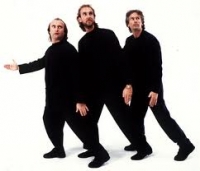
Genesis are an English rock band that formed in 1967. The band currently comprises the longest-tenured members Phil Collins, Mike Rutherford and Tony Banks. Past members Peter Gabriel, Anthony Phillips and Steve Hackett also played major roles in the band in its early years. Genesis are among the top 30 highest-selling recording artists of all time with approximately 150 million albums sold worldwide.
Mozart

Wolfgang Amadeus Mozart, full name Johann Chrysostom Wolfgang Amadeus Mozart (27 January 1756 â 5 December 1791) was a prolific and influential composer of the Classical era. His over 600 compositions include works widely acknowledged as pinnacles of symphonic, concertante, chamber, piano, operatic, and choral music. Mozart is among the most enduringly popular of classical composers, and many of his works are part of the standard concert repertoire.
Mozart's music, like Haydn's, stands as an archetypal example of the Classical style. His works spanned the period during which that style transformed from one exemplified by the style galant to one that began to incorporate some of the contrapuntal complexities of the late Baroque, complexities against which the galant style had been a reaction. Mozart's own stylistic development closely paralleled the development of the classical style as a whole. In addition, he was a versatile composer and wrote in almost every major genre, including symphony, opera, the solo concerto, chamber music including string quartet and string quintet, and the piano sonata. While none of these genres were new, the piano concerto was almost single-handedly developed and popularized by Mozart. He also wrote a great deal of religious music, including masses; and he composed many dances, divertimenti, serenades, and other forms of light entertainment.
The central traits of the classical style can be identified in Mozart's music. Clarity, balance, and transparency are hallmarks of his work.
Mozart's music, like Haydn's, stands as an archetypal example of the Classical style. His works spanned the period during which that style transformed from one exemplified by the style galant to one that began to incorporate some of the contrapuntal complexities of the late Baroque, complexities against which the galant style had been a reaction. Mozart's own stylistic development closely paralleled the development of the classical style as a whole. In addition, he was a versatile composer and wrote in almost every major genre, including symphony, opera, the solo concerto, chamber music including string quartet and string quintet, and the piano sonata. While none of these genres were new, the piano concerto was almost single-handedly developed and popularized by Mozart. He also wrote a great deal of religious music, including masses; and he composed many dances, divertimenti, serenades, and other forms of light entertainment.
The central traits of the classical style can be identified in Mozart's music. Clarity, balance, and transparency are hallmarks of his work.
Samuel Barber

Samuel Osborne Barber II (March 9, 1910 – January 23, 1981) was an American composer of orchestral, opera, choral, and piano music. He is one of the most celebrated composers of the 20th century: music critic Donal Henahan stated that "Probably no other American composer has ever enjoyed such early, such persistent and such long-lasting acclaim."
His Adagio for Strings (1936) has earned a permanent place in the concert repertory of orchestras. He was awarded the Pulitzer Prize for Music twice: for his opera Vanessa (1956–57) and for the Concerto for Piano and Orchestra (1962). Also widely performed is his Knoxville: Summer of 1915 (1947), a setting for soprano and orchestra of a prose text by James Agee. At the time of his death, nearly all of his compositions had been recorded.
His Adagio for Strings (1936) has earned a permanent place in the concert repertory of orchestras. He was awarded the Pulitzer Prize for Music twice: for his opera Vanessa (1956–57) and for the Concerto for Piano and Orchestra (1962). Also widely performed is his Knoxville: Summer of 1915 (1947), a setting for soprano and orchestra of a prose text by James Agee. At the time of his death, nearly all of his compositions had been recorded.
Michael Buble

Michael Steven Bublé (born 9 September 1975) is a Canadian big band singer. He won several awards, including a Grammy and multiple Juno Awards. While achieving modest chart success in the United States, his 2003 self-titled album has reached the top ten in Lebanon, the UK and his home country. However, he did find commercial success in the U.S. with his 2005 album It's Time. He has sold over 18 million albums. Michael has also appeared on the TV series Rove four times.
The album Michael Bublé was released by Warner Bros. Records just before Valentine's Day in 2003. The album was actually first released by the Warner company in South Africa, where the album went into the Top 5 and was certified Gold. Soon after that, it entered the Canadian album charts. As success in the USA was marginal at best, Bublé started visiting countries all over the world, with the album being successful in places like the Philippines and Singapore. He then moved on to placed like Italy and eventually had chart success in the UK, U.S., Australia and elsewhere soon followed with the album going Platinum and reaching the top ten of the album charts in the UK and Canada and going all the way to #1 in Australia. The album has reached the top 50 of the Billboard 200 album charts in the U.S. His version of George Michael's "Kissing a Fool" was released as a single from the album and reached the top 30 of the Billboard Hot Adult Contemporary Tracks chart. "How Can You Mend a Broken Heart?" reached the top 30 of the Billboard Adult Contemporary chart as well. His third single "Sway" also reached the top 30 of the Adult Contemporary chart, while a Junkie XL remix of the song reached the top 20 in Australia in May 2004.
Bublé's second studio album, It's Time, debuted as a hugely successful performance. The album reached number 7 on the Billboard 200 album chart and number 2 on the ARIA Album Charts in Australia. It's Time also debuted at number 4 on the UK Album Charts. The album features covers of Beatles and Ray Charles songs, and the hit single "Home".
The album Michael Bublé was released by Warner Bros. Records just before Valentine's Day in 2003. The album was actually first released by the Warner company in South Africa, where the album went into the Top 5 and was certified Gold. Soon after that, it entered the Canadian album charts. As success in the USA was marginal at best, Bublé started visiting countries all over the world, with the album being successful in places like the Philippines and Singapore. He then moved on to placed like Italy and eventually had chart success in the UK, U.S., Australia and elsewhere soon followed with the album going Platinum and reaching the top ten of the album charts in the UK and Canada and going all the way to #1 in Australia. The album has reached the top 50 of the Billboard 200 album charts in the U.S. His version of George Michael's "Kissing a Fool" was released as a single from the album and reached the top 30 of the Billboard Hot Adult Contemporary Tracks chart. "How Can You Mend a Broken Heart?" reached the top 30 of the Billboard Adult Contemporary chart as well. His third single "Sway" also reached the top 30 of the Adult Contemporary chart, while a Junkie XL remix of the song reached the top 20 in Australia in May 2004.
Bublé's second studio album, It's Time, debuted as a hugely successful performance. The album reached number 7 on the Billboard 200 album chart and number 2 on the ARIA Album Charts in Australia. It's Time also debuted at number 4 on the UK Album Charts. The album features covers of Beatles and Ray Charles songs, and the hit single "Home".
Beethoven

Ludwig van Beethoven (16 December 1770 - 26 March 1827) was a German composer and pianist. He was a crucial figure in the transitional period between the Classical and Romantic eras in Western classical music, and remains one of the most respected and influential composers of all time.
Born in Bonn, then in the Electorate of Cologne (now in modern-day Germany), he moved to Vienna in his early twenties and settled there, studying with Joseph Haydn and quickly gaining a reputation as a virtuoso pianist. Beethoven's hearing gradually deteriorated beginning in his twenties, yet he continued to compose masterpieces, and to conduct and perform, even after he was completely deaf.
Born in Bonn, then in the Electorate of Cologne (now in modern-day Germany), he moved to Vienna in his early twenties and settled there, studying with Joseph Haydn and quickly gaining a reputation as a virtuoso pianist. Beethoven's hearing gradually deteriorated beginning in his twenties, yet he continued to compose masterpieces, and to conduct and perform, even after he was completely deaf.
 Sheet Music Mobile is a site for those who wants to access popular sheet music easily,
letting them download the sheet music for free for trial purposes.
It's completely free to download and try the listed sheet music, but you have to delete the files after 24 hours of trial.
Don't forget, if you like the piece of music you have just learned playing,
treat the artist with respect, and go buy the original sheet music.
Sheet Music Mobile is a site for those who wants to access popular sheet music easily,
letting them download the sheet music for free for trial purposes.
It's completely free to download and try the listed sheet music, but you have to delete the files after 24 hours of trial.
Don't forget, if you like the piece of music you have just learned playing,
treat the artist with respect, and go buy the original sheet music.